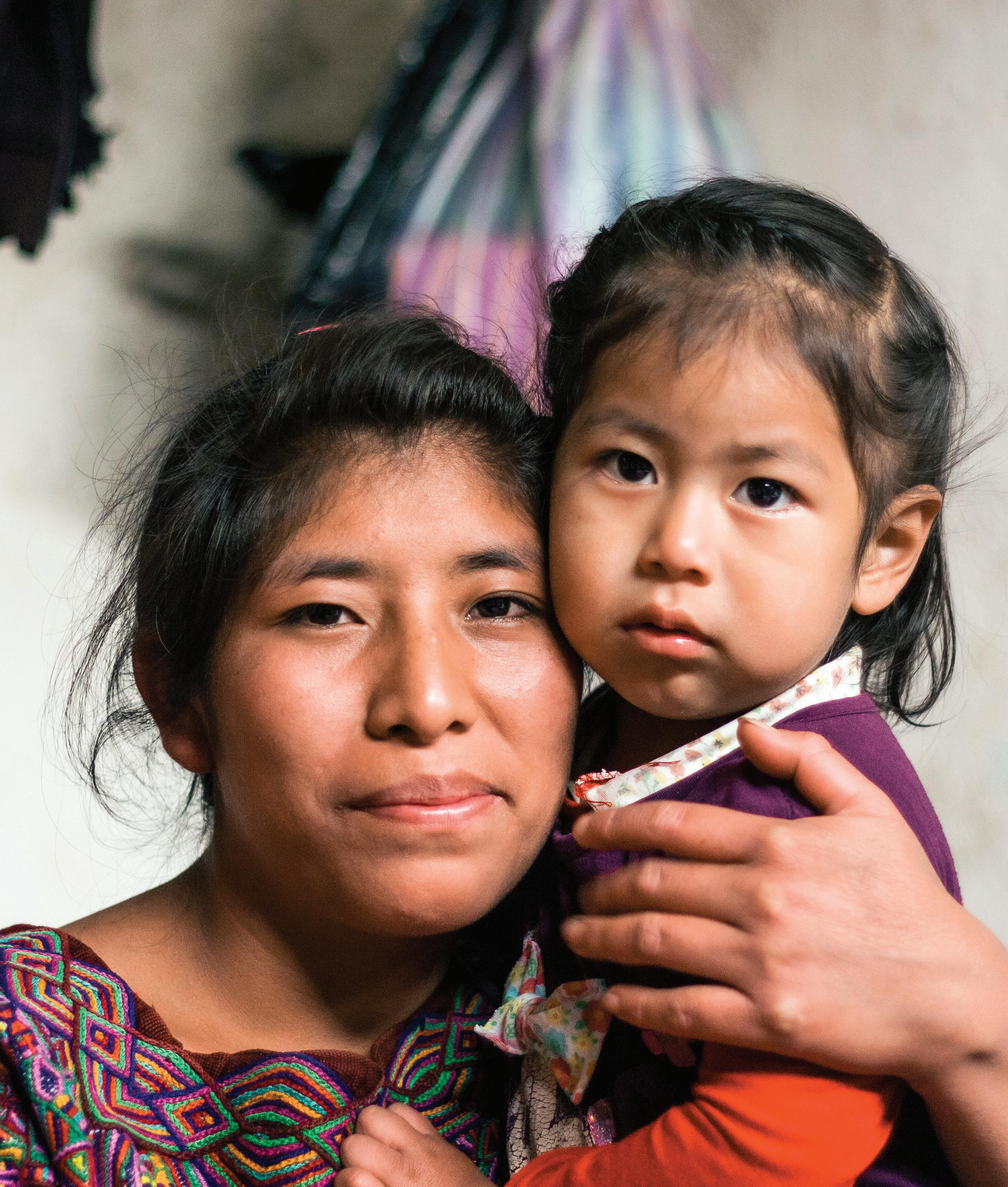

Just Start! Page 16 ISSUE 28 Please Pass the Sausages Page 12 Recipes: Asian Appies! Page 14
Page 3 Courage
STORIES OF HOPE FROM AROUND THE WORLD
COMMUNITIES OF
Communities of Courage
Brewing a Generous Cup of Coffee
Heroes of Transformation: Meet Tina
Please Pass the Sausages
Recipes: Asian Appies!
Just Start!
Gift Guide: Courage to Thrive
You Can't Outgive God
ISSUE 28
SPRING 2021
Food for the Hungry (FH) Canada’s seasonal publication, celebrating stories of hope from partnered communities around the world.
Editorial: Eryn Austin-Bergen, Colton Martin, Mark Petzold, Michael Prins
Design: Tyler Anaya
Contributors: Nazma Akhtar, Laura Balzer, Rhonda Davison, Ingrid Paola Delgado, Mike Janz, Channalen Koun, Aaron & Kyla Meston, Ken Nettleton, Kari Petzold, Hannelore Ponto, Sneha Reddy, Silean Seng, Henry Wikkerink, Carissa Youssef, and other valued FH staff and friends.
FROM THE PRESIDENT
It takes courage to keep pushing in the face of fear. This past year, the unknown has brought fear to the entire world. But I’ve seen courage break through the grimmest situations, and it’s courage that continues to move FH partner communities forward.
Leaders, teachers, parents, and children alike have persevered in the face of unprecedented circumstances, and so have you!
This issue of HopeNotes is full of their stories and your stories. In these pages, you’ll read about courageous individuals like Belaynesh from Ethiopia, who stepped out to join FH agricultural workshops and started her own garden, planting a variety of nutritious vegetables in order to feed her family. Or of Hannelore, a Canadian supporter who started sewing masks and selling them to raise money for partner communities.

Thank you for giving courageously in 2020. Your engagement, support, and care for FH partner communities enables them to continue stepping out in courage as they end poverty in their own communities.
Gratefully,
Food for the Hungry (FH) Canada is a Christian, non-profit organization dedicated to facilitating sustainable, community development in order to bring about longterm transformation for those stuck in poverty. Through project development, Child Sponsorship, and emergency relief, FH Canada strives to relieve all forms of poverty—physical, spiritual, social, and personal.
Our Purpose:
To end poverty, one community at a time.
Our Promise:
To graduate communities from poverty in 10 years.
81.3% Building Sustainable Communities
14.0% Invested to generate income
4.7% Administration & Running Costs
Shawn Plummer President & CEO

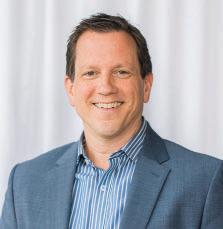
As a Certified Member of the Canadian Council for Christian Charities, FH Canada meets the stringent standards set by the


CCCC for accountability and organizational integrity.
CHARITABLE REGISTRATION NUMBER: 132152893RR0001


FH CANADA
1-31741 Peardonville Road, Abbotsford, BC V2T 1L2
T 604.853.4262
TF 1.800.667.0605
F 604.853.4332
info@fhcanada.org
www.fhcanada.org
@fh-canada @fhcanada
@foodforthehungrycanada
blog.fhcanada.org
@fhcanada
Page
Page
Page
Page
Page
Page
Page 3
7
10
12
14
16
18 Page 20
2
Communities of Courage
by Eryn Austin-Bergen
Have you ever tried to change your family’s diet? Convince your children to eat new foods like cauliflower rice or chopped spinach in their tomato sauce? It can be a hard sell. Many of us struggle with change. Perhaps you’ve had to learn a new and seemingly impossible computer program for work, adapt to driving a manual car, or cut monthly expenses in order to save for that replacement phone you really need? It takes courage to change a habit or routine, try new technologies, or embrace different beliefs. And we all know new habits aren’t formed in a day! We have to persist (especially with that cauli flower rice), sometimes fail, and muster the courage to try again.
FH partner communities around the world daily show this courage as they attend FH workshops, adjust their parenting styles, grow new foods, share lifestyle-changing ideas with their neighbours, and so much more to create a brighter future. The COVID-19 pandemic brought significant challenges for all of us, including those living in FH partner communities. But volunteer leaders have courageously stepped-up, keeping their eye on community development goals in spite of new challenges. They’re moving their families and neighbours forward toward thriving sustainability. These individuals’ stories of transformation and hope for the future stand as a testimony to the courage of communities on their journey out of poverty.
Courage in Scarcity Char Borobila, Bangladesh
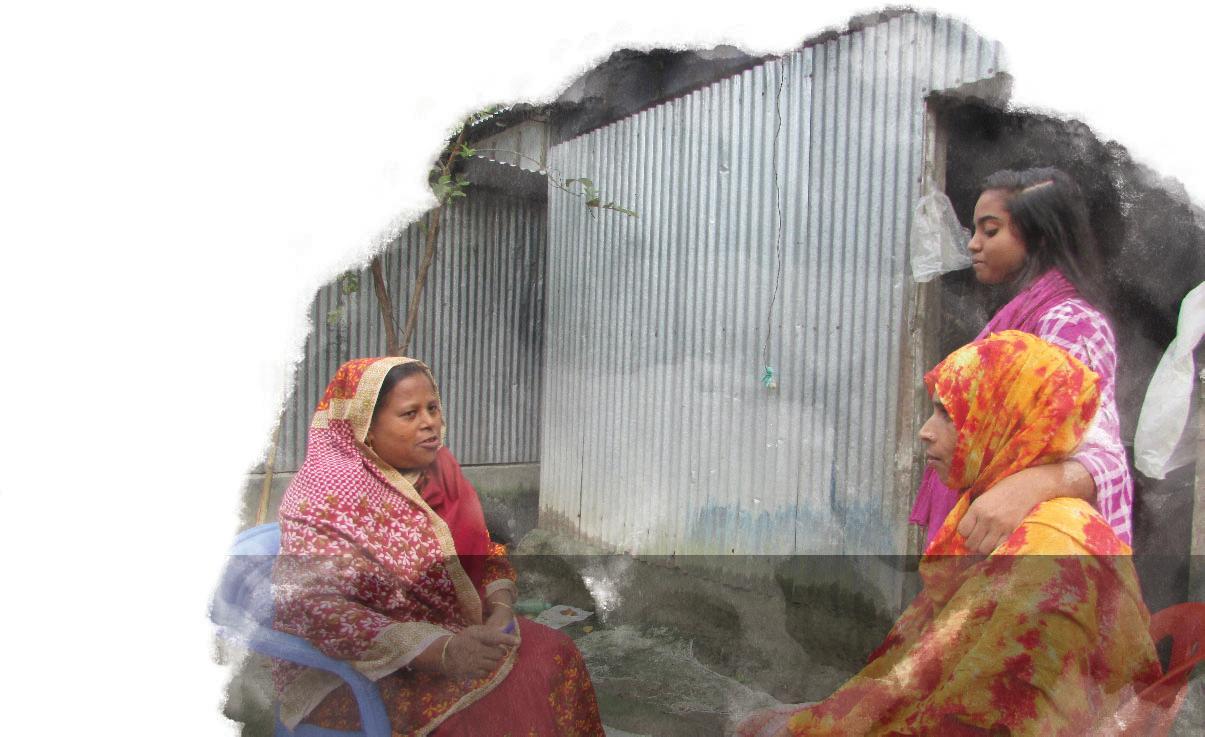
Before joining FH, Muslima’s community was struggling. People lacked literacy, access to sanitation and clean water, and a reason to send their children to school. In addition, everyone was fighting so hard to survive, there was little group cooperation. The rate of child labour and child marriage was high. Like most in the community, Muslima’s family of seven struggled financially. It was a strain just to meet their daily needs. Her husband’s meagre earnings as a day labourer meant nothing could be saved.
When FH started Savings and Loans groups in the area, Muslima made the decision to try something new. It was a big step to join a social group outside her household. Most

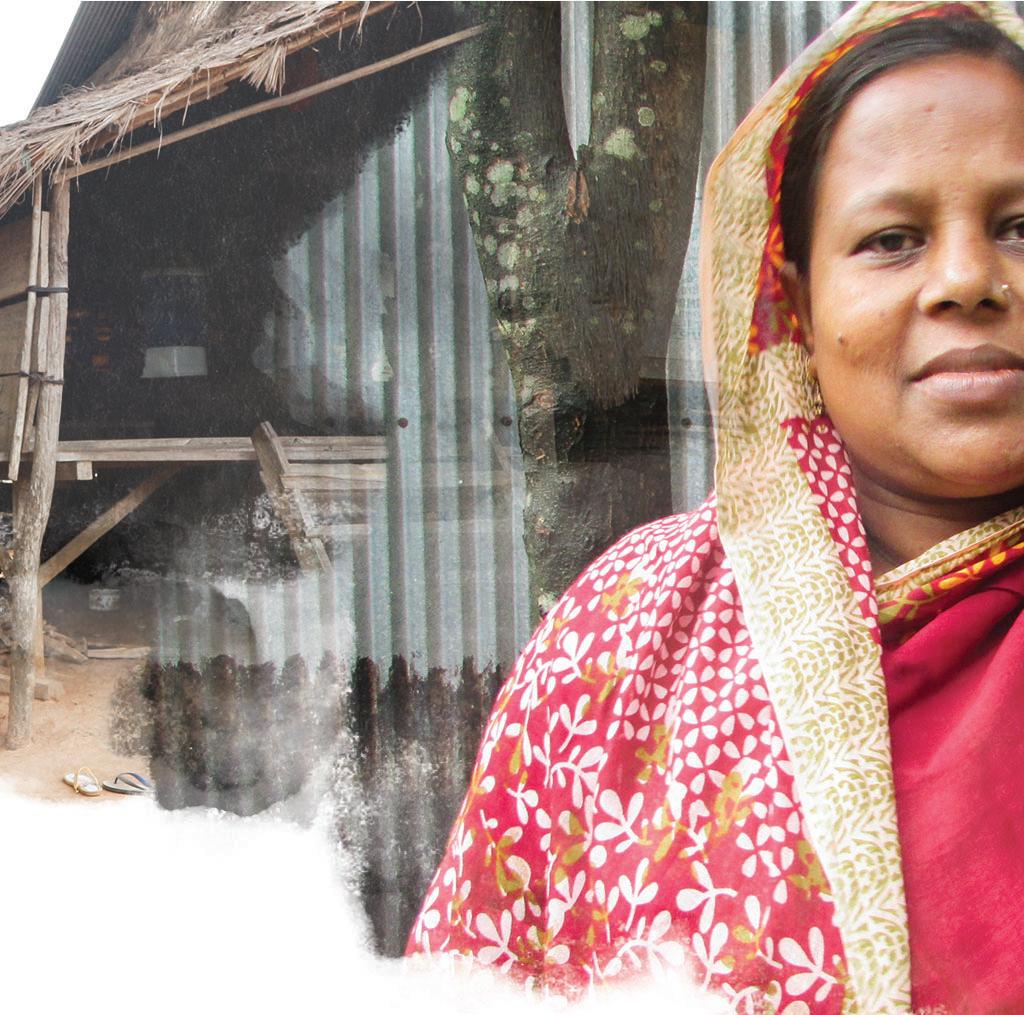
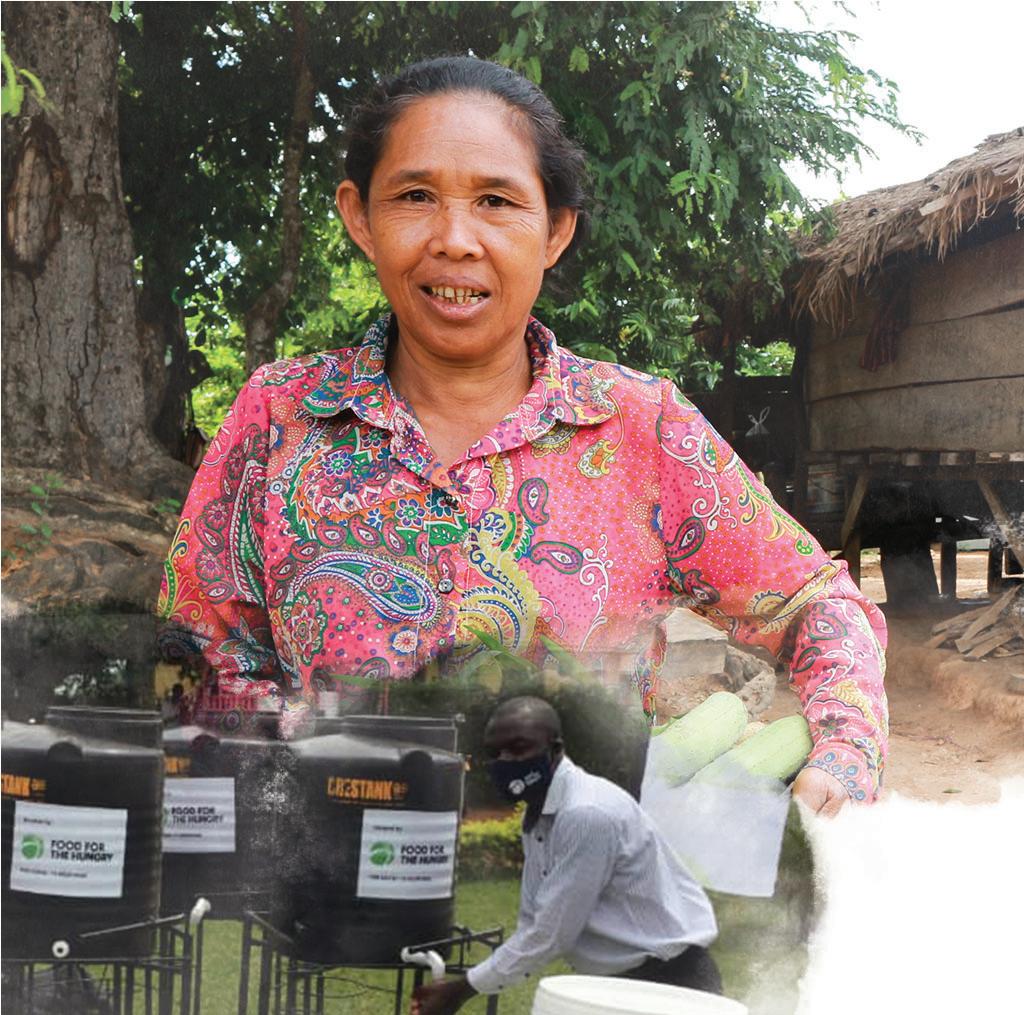
“
II could not do anything before the training...[Now] we can use our skills for income generation as well as for the development of the society. I am grateful because it brought development among helpless people.”
— Muslima
 Because of Muslima’s intervention, this mother stopped the marriage of her underage daughter.
Because of Muslima’s intervention, this mother stopped the marriage of her underage daughter.
3 FHCANADA.ORG
Bangladeshi women living in rural areas don’t form relationships with non-relatives; in extreme cases they’re discouraged from even leaving the house without a family member. But in collaboration with 16 other women, Muslima dared to help form Golap (Rose) Women’s Development Group. Her peers quickly recognized her untapped gifts and appointed her as secretary. Muslima participated in leadership development training with FH and began to see her own potential to change her circumstances.
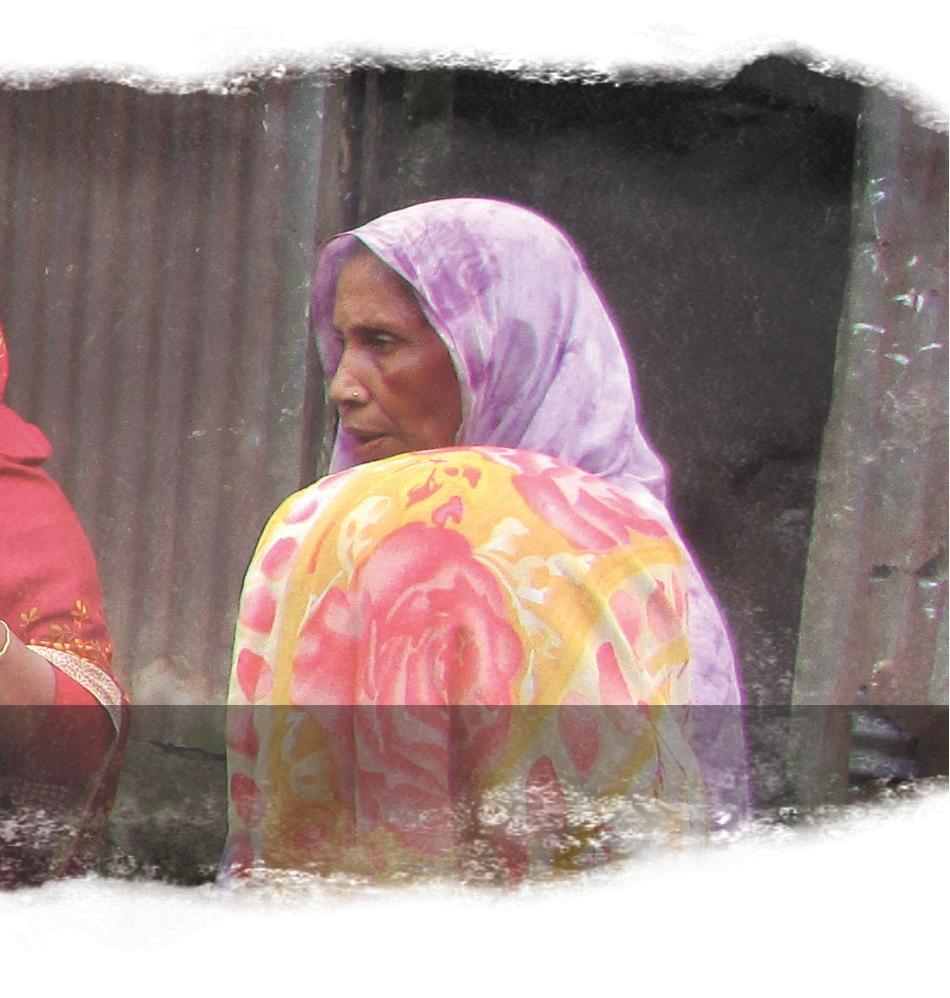
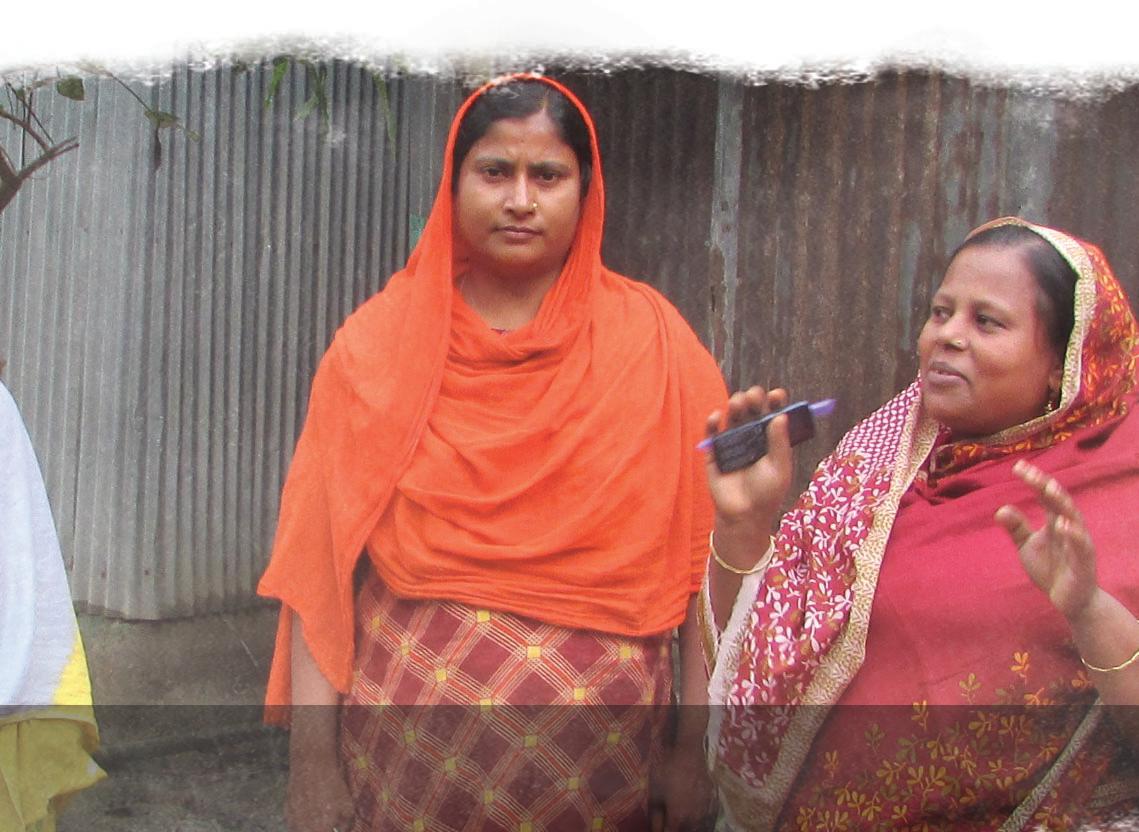
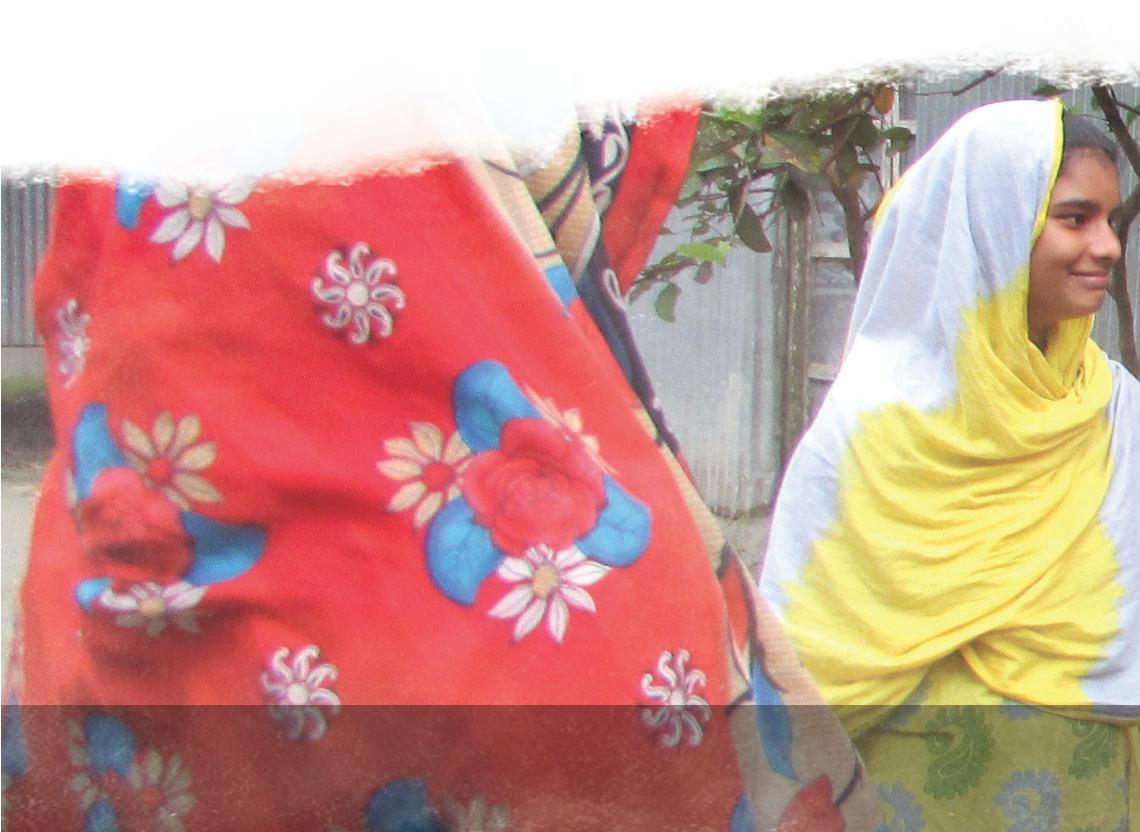
She embraced sewing training with FH and began making and selling clothing in her community. With her new venture, one stitch and spool at a time, she began to raise her family income! Finally, they could even tuck a few taka away. This had such a powerful effect on their daily lives that Muslima is sharing the knowledge by teaching other women in the community how to sew. Additional FH workshops also empowered the community with critical health and education information so that Muslima’s family’s health has improved and she sees the value of sending her children to school. With these positive changes, her family has grown closer.
As she gained leadership experience, Muslima took on leading a Cascade health group. She’s now a respected member of her community and helps resolve conflicts among neighbours; she was even able to stop a child marriage. Her new role in the community has shifted the way her family views her. Previously, her opinions didn’t carry much weight; now family members consult her before making any major decisions.
Through leaders like Muslima, the whole community is changing. Neighbours are willing to help each other, family con flicts have decreased, and more children attend school. As parents’ attitudes change, child marriage and child labour have become less common. Because of one woman’s courageous example, more people are daring to dream and serve their community.
“I feel lucky to be part of FH’s [work],” Muslima shares. “I could not do anything before the training I received. Not only me but also many people who were left behind [in poverty] could participate in FH awareness and learning sessions. We can use our skills for income generation as well as for the development of the society. I am grateful because it brought development among helpless people.”
Courage to Learn Together
Ta Siem, Cambodia
“
As a volunteer, I am more courageous now and am not afraid. I have good relationships with my neighbours because we learn together.
Vouch Sor is a caregiver volunteer trained by FH Cambodia. These special caregivers’ primary focus is to improve the lives of the children in their village and includes education on children’s mental and emotional development, health and hygiene, and nutrition. In addition, Sor and her husband participated in agricultural training to improve their family’s income and food security. These days, health and hygiene lessons also include
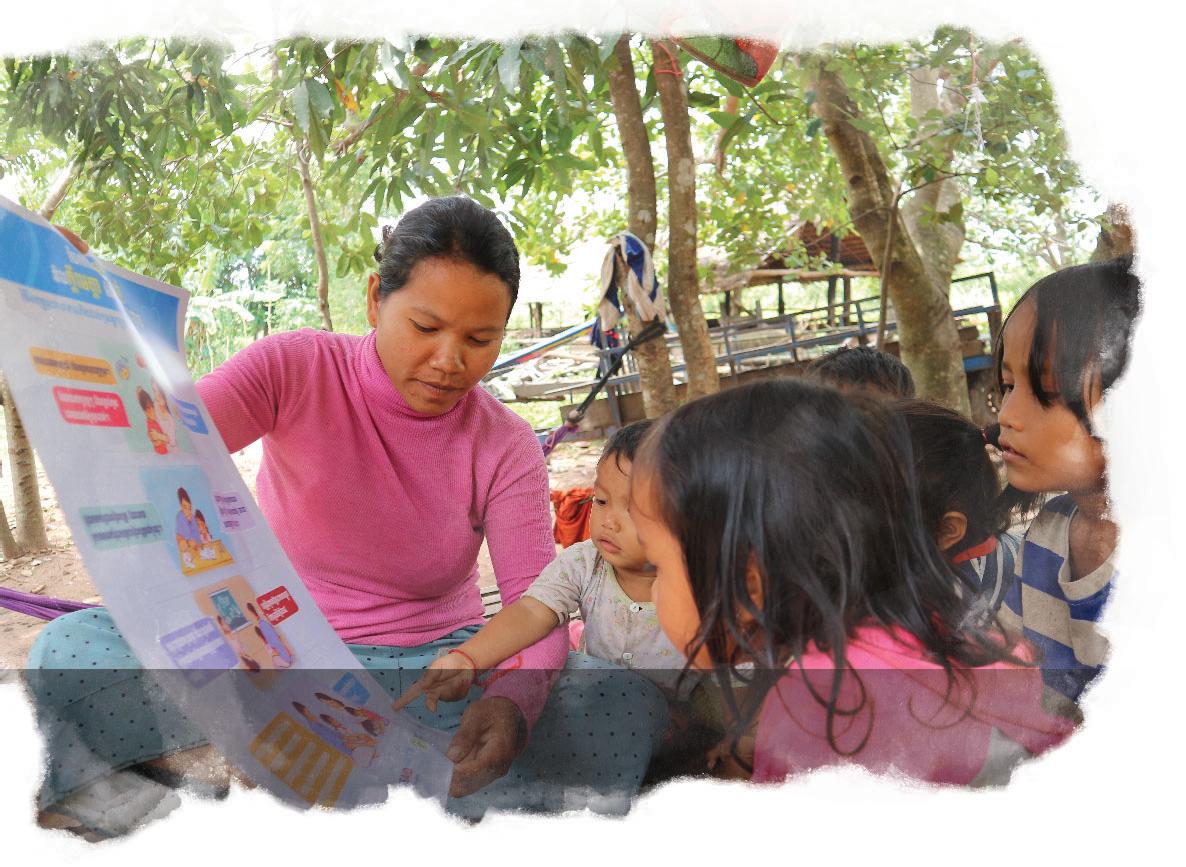
”
— Vouch Sor
Bringing women together to learn from and support each other not only strengthens individual households, but lifts up the entire community, as well.
4 ISSUE 28
Teaching children basic yet life-saving hygiene (like handwashing!) is one way volunteers ensure the health and wellbeing of the next generation.
how to protect herself, her family, and her community from COVID-19.

Before partnering with FH, Sor explains how her family was struggling in poverty. “Ten years ago when we arrived in this village, we were having a very dif ficult life. We built a house which can provide us shelter but we did not have any latrine… My eldest son at that time was 15 years old and dropped out of school.… During those times, we were living day-by-day to just survive.”
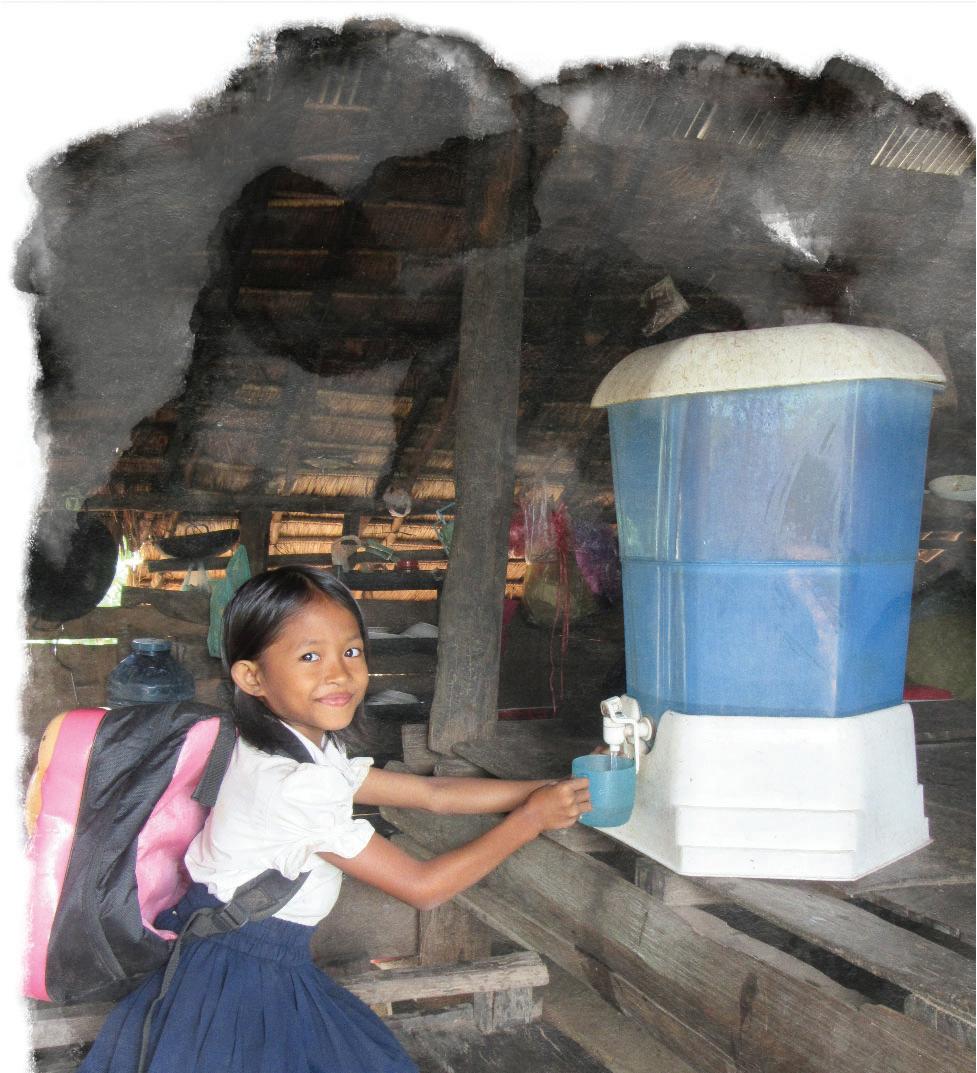
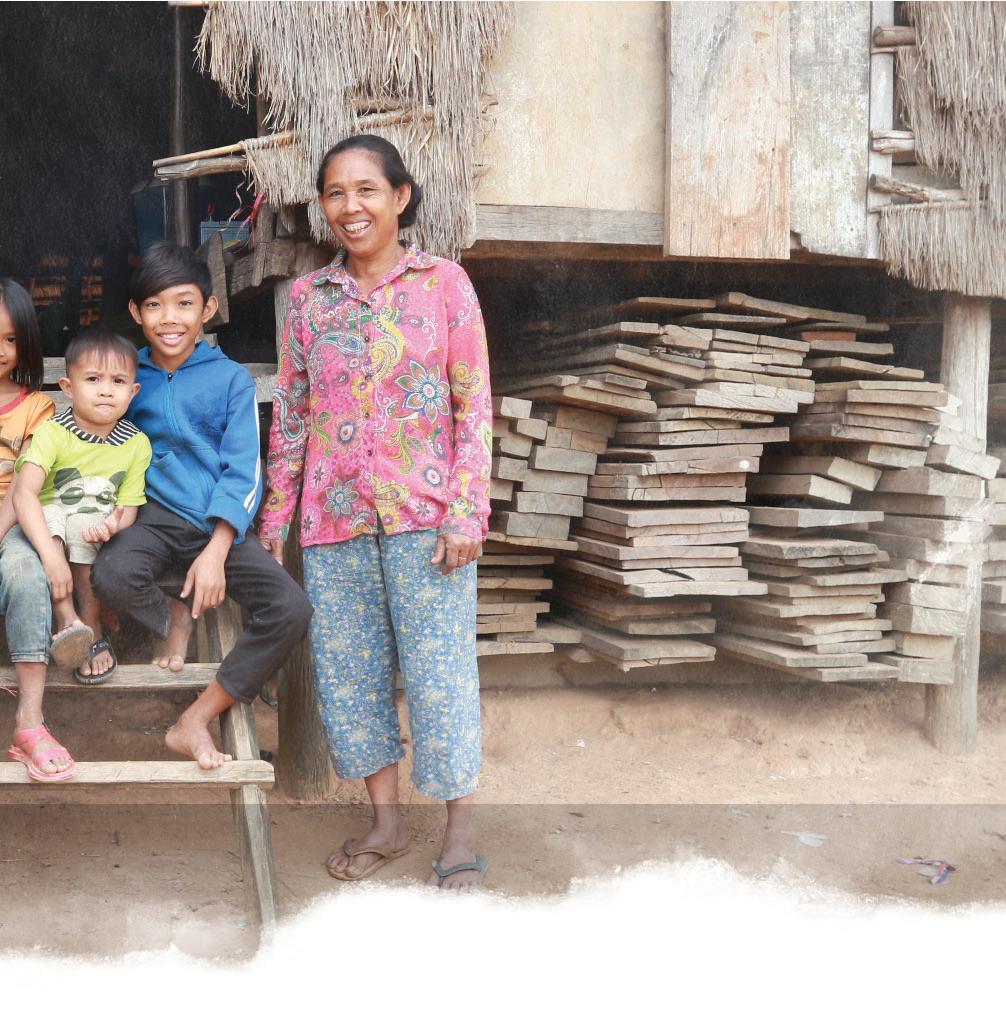
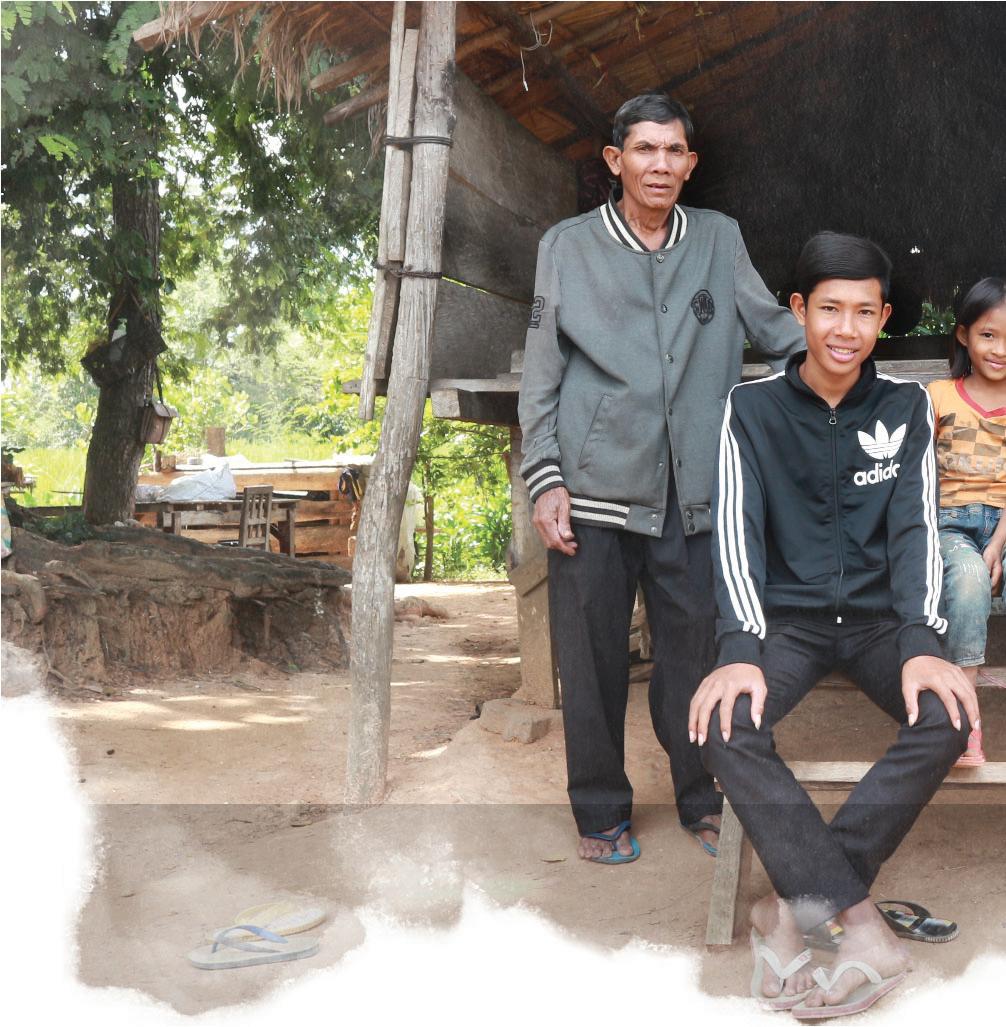
Then Sor started attending FH meetings with fellow villagers. Along with many of her peers, Sor agreed to have her two youngest children join child sponsorship. This was a door that opened opportunities for her and her husband to begin making significant changes in their family’s life. Together with other village members, Sor became a volunteer and began learning and working alongside her neighbours for the betterment of her community. “As a volunteer, I am more courageous now and am not afraid. I have good relationships with my neighbours because we learn together. I am driven to share my new knowledge with my neighbours. I always join in community activities and want to help in whatever way I can.” In addition to volunteering in her community, Sor also boosted her family’s health by building a home latrine and installing a water filter.
So far, her favourite group training has been how to make toys for young children using materials easily found in the community, often upcycling pre-used items. “I learned a lot and I came to understand about the development of our children, especially their brain development,” Sor shares. “We also know how to respond to newborn babies to help them develop.”
Sor is grateful for the changes she and her community are making as they learn together, not only as caregivers, but
also in Savings and Loans groups. Through participating in group-based saving, Sor and her husband expanded their farm and began raising chickens, improving their food security and income. With a smile on her face, Sor says, “We see a brighter future for our children. I increased my knowledge and despite the limitation of my own education in school, it was not a hindrance for me to learn new things.”
Sor with her husband, younger children, and grandchildren outside their family home.
5 FHCANADA.ORG
Sor’s granddaughter can now spend more time in school and less time at home sick because she has clean, filtered water to drink.
Courage in a Pandemic

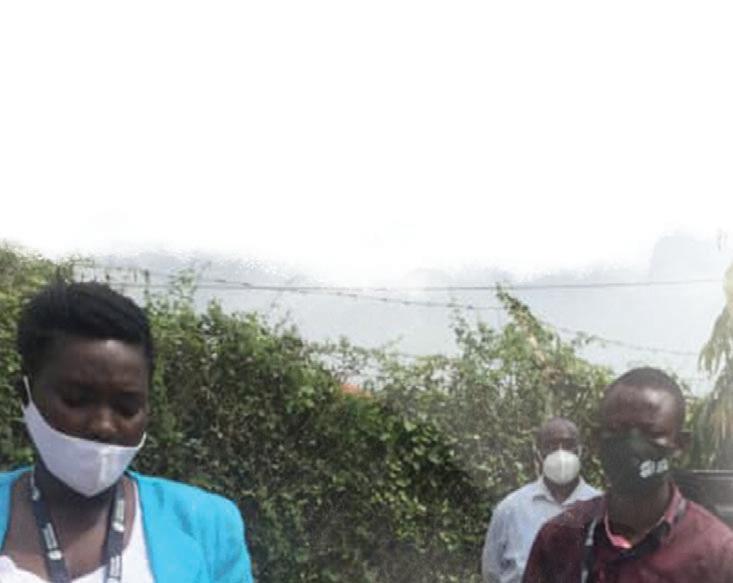 Bukiende, Uganda
Bukiende, Uganda
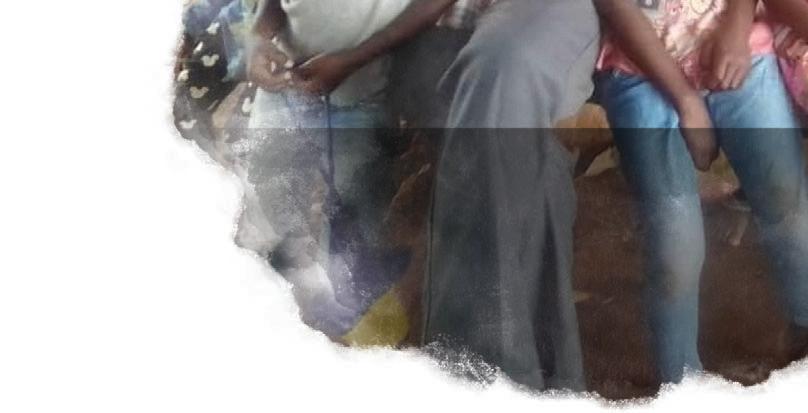
When news of COVID-19 reached Bukiende, everyone was scared. Misinformation was rampant, rumors abounded, and panic spread.
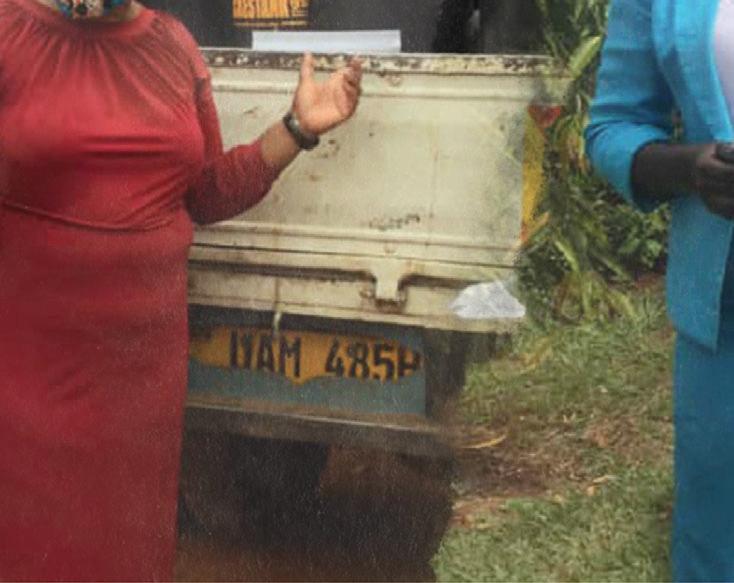
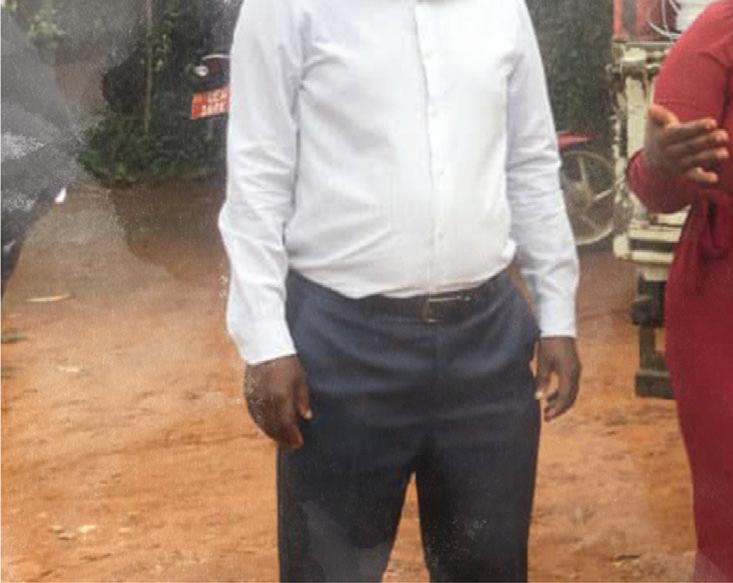
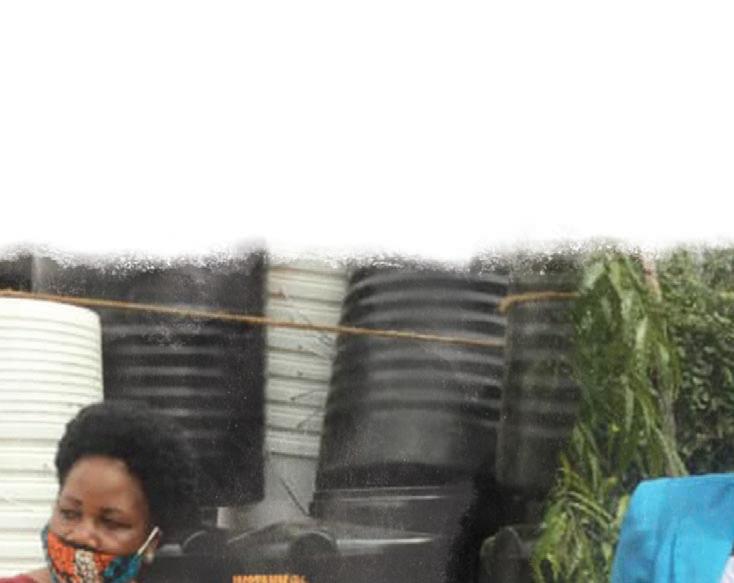
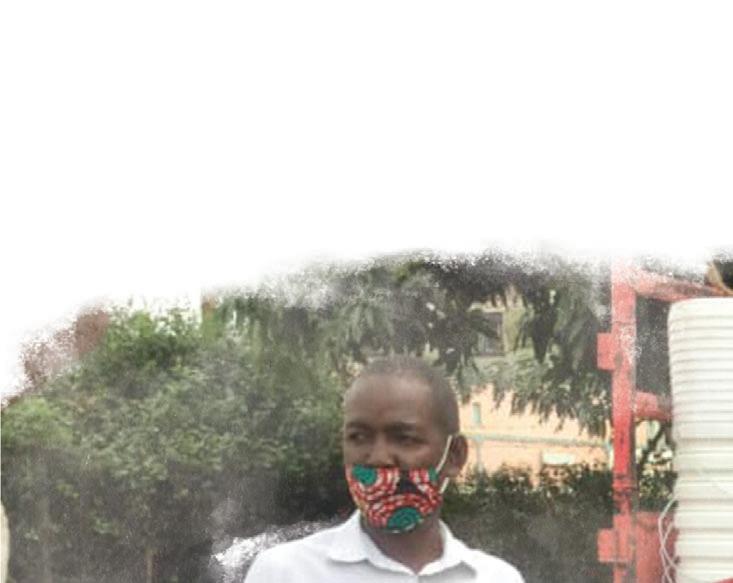
Fred was worried for his family. He and his wife, Naigaga, care for their own daughter and two sons, as well as three additional children from the community. He didn’t know how to protect them from the virus. Thankfully, Fred is a member of his Village Health Team. These sel fl ess volunteers dedicate their own time to learning critical health lessons from FH and sharing that information with neighbours. In 2020, alongside other volunteers from the community, Fred attended life-saving COVID-19 awareness training. While many in the village were afraid to leave their homes because of the virus, Fred and the Village Health Team began safely moving through the community to battle the rumors and empower people to stay safe.
Fred shares that, due to the Village Health Team’s efforts, “the best COVID-19 prevention practices such as wearing a mask, physical distancing, and regularly washing hands with clean water and soap have been greatly adopted by community members, especially within communal spaces like the market and health facilities. I am very vigilant when it comes to implementing preventive measures and ensure to constantly remind my fellow brothers and sisters to remain alert.” In addition to measures to stop the spread of the virus, the volunteers also learned and shared about nutritious foods that
are easy to grow which will boost children’s immune systems.
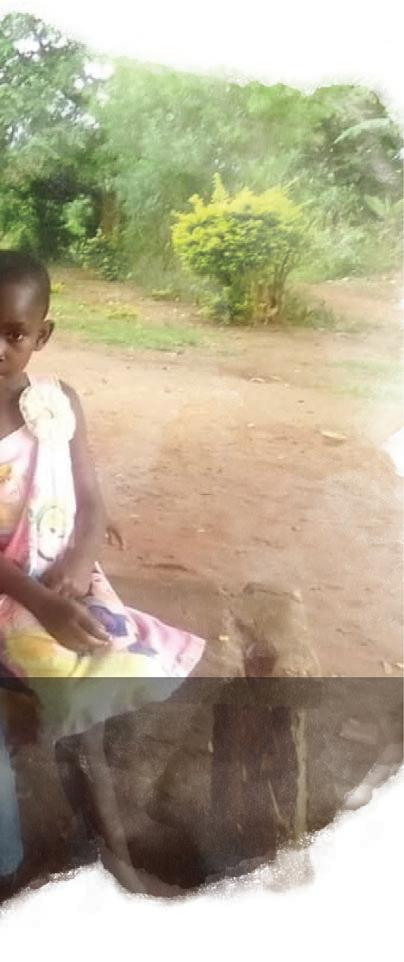
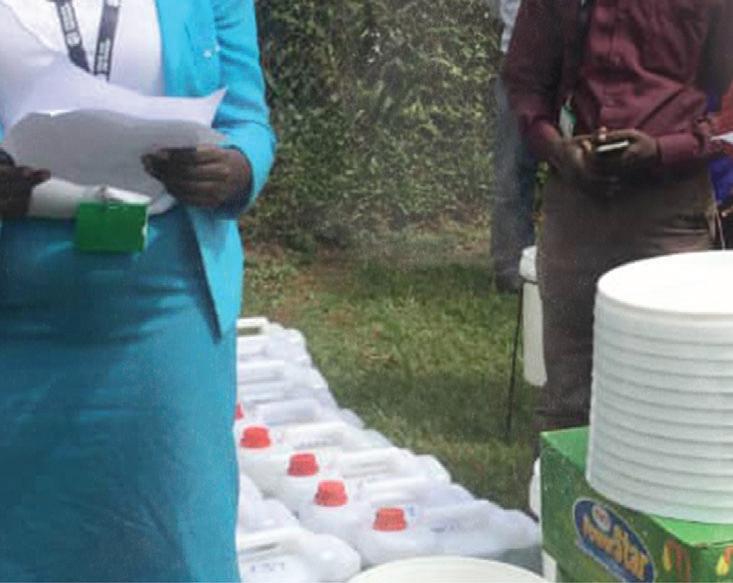
“Within this short time, I feel valued and hopeful,” Fred says, “I know there are people out there like the FH team who have our best interests at heart.”
While Fred now feels con fident his village can weather the pandemic, these times are not without their struggles. His main source of income is from running a private school, but due to lockdown measures the school has been closed for months. To support themselves, the family has ramped up their farming.
With the support of volunteers like the Village Health Team, the community continues to work together to build a future of hope, looking beyond the pandemic. Dreaming of tomorrow, Fred shares, “I would like to lead an exemplary life for my children, see them complete school, create more sources of income from my farming, adopt improved practices regarding health and finances to provide a better future for my little ones, and have a peaceful and happy home.”
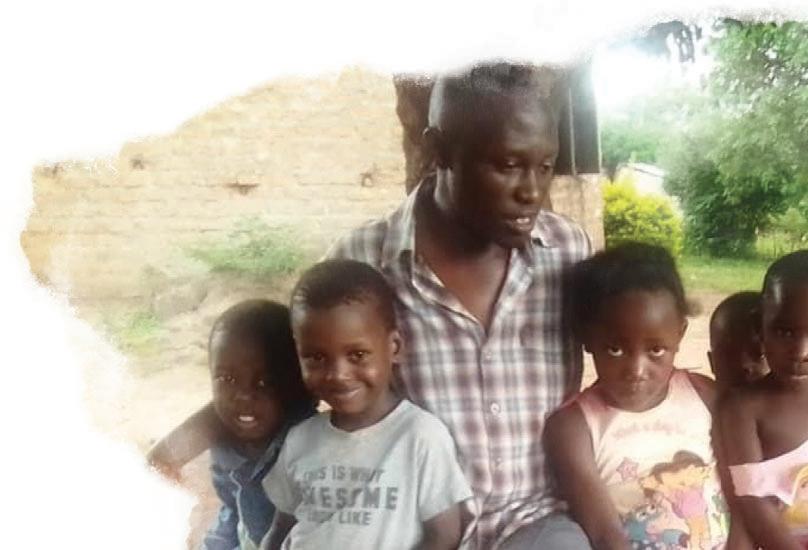
“I felt worried and helpless on how we would survive this pandemic but with the trainings I have been a part of, I feel more empowered that we will beat COVID-19 and come out stronger, healthier, and wiser at the end.”
— Fred
6 ISSUE 28
Fred took in three additional children from the community who needed a caretaker—a common practice in Uganda—making them a large family of eight.
Brewing A Generous Cup of Coffee
Written by Mike Janz

Take a Sunday morning sip of your complimentary cappuccino, made with Guatemalan coffee imported and roasted specifically for New Life Church’s Brew Life Cafe, and you will be awakened to the possibility of great tasting coffee grown out of committed relationships.
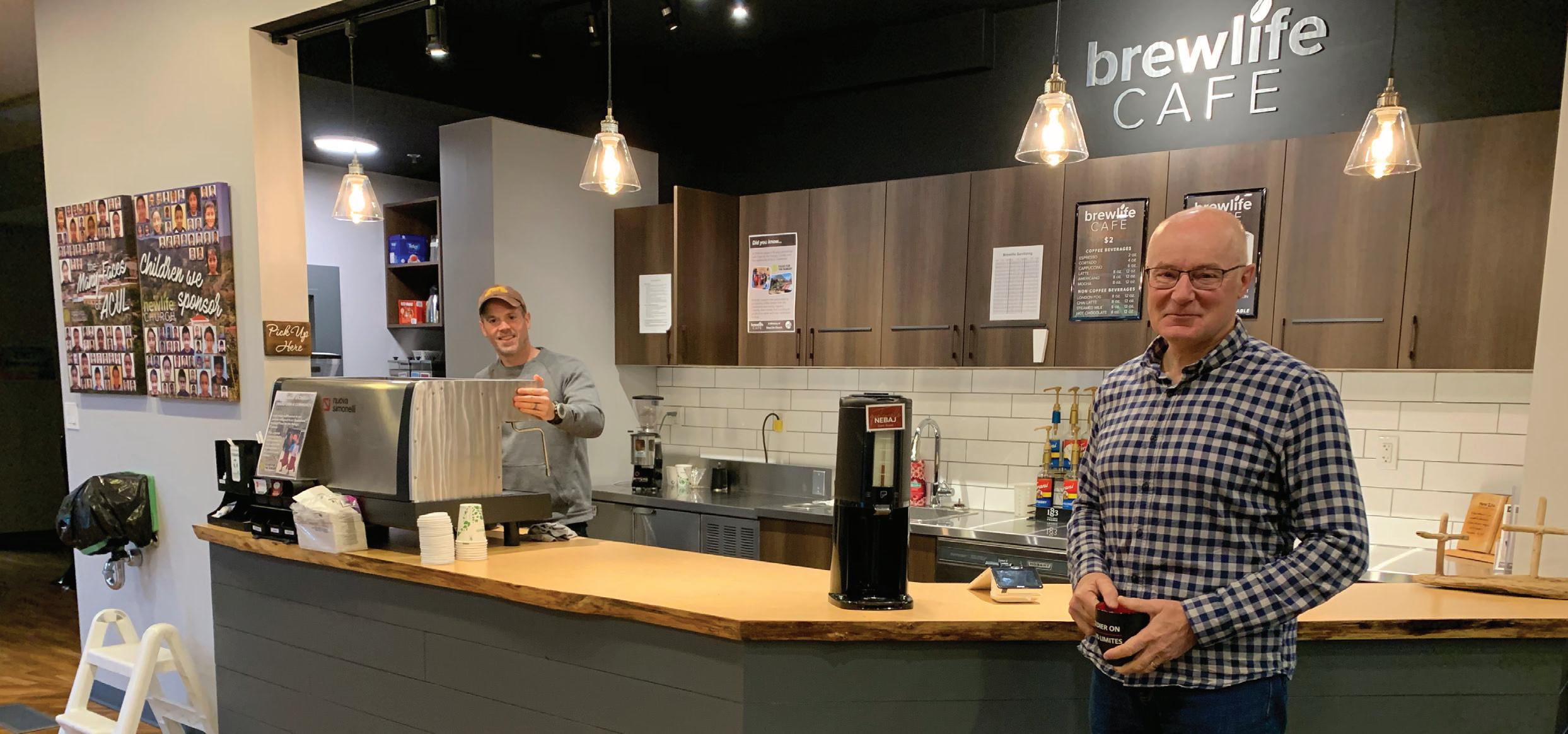
Church coffee is rarely revered for its high quality. It is free. It gives us something to do with our hands as we mingle. It is morning, and we are tired! But the coffee served at the Brew Life Cafe is not just your average church coffee. Yes, it will wake you up and warm your hands, but there is more to it than that. This is coffee that is both good and GOOD.
What do we mean by good coffee, and how does a church end up importing coffee directly from Guatemala, and then serving it at their own cafe? Pour yourself a mug of your favourite brew and settle in for a story…
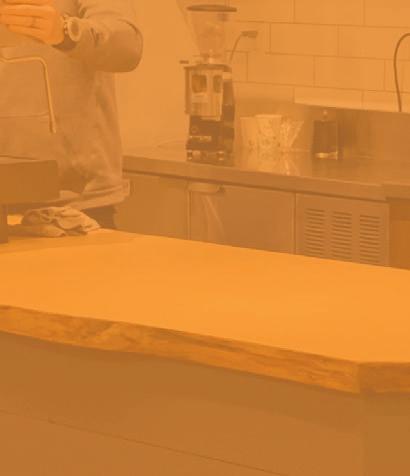
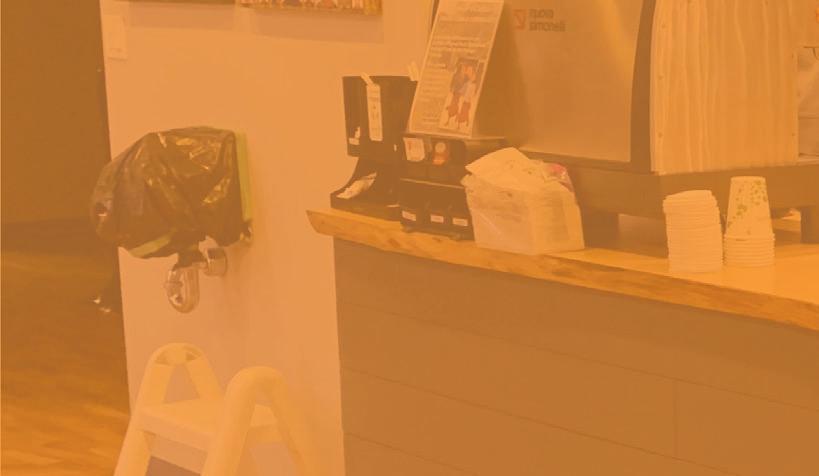
A Food for the Hungry (FH) partner church for the past five years, New Life Church in Duncan, BC has been drawn deeper into the rhythms of God’s heartbeat for justice and equity through a developing relationship with the people of Acul, Guatemala. Ken Nettleton, New Life’s Lead Pastor, believes that the coffee part of this story is simply one step along the path of transformation. “The heartbeat of God is that God’s mind and heart are given to us,” Ken explains. One result of this partnership is a growing awareness and connection to all the relationships that come together to make a great cup of coffee.
A few years ago while visiting his sponsor child in Guatemala, Andrew MacDonald, Teaching Pastor at New Life, noticed coffee growing in the yard. He asked if he could buy some of the coffee, and the family carefully handpicked the coffee, choosing only the ripest cherries. With one cup of coffee requiring around

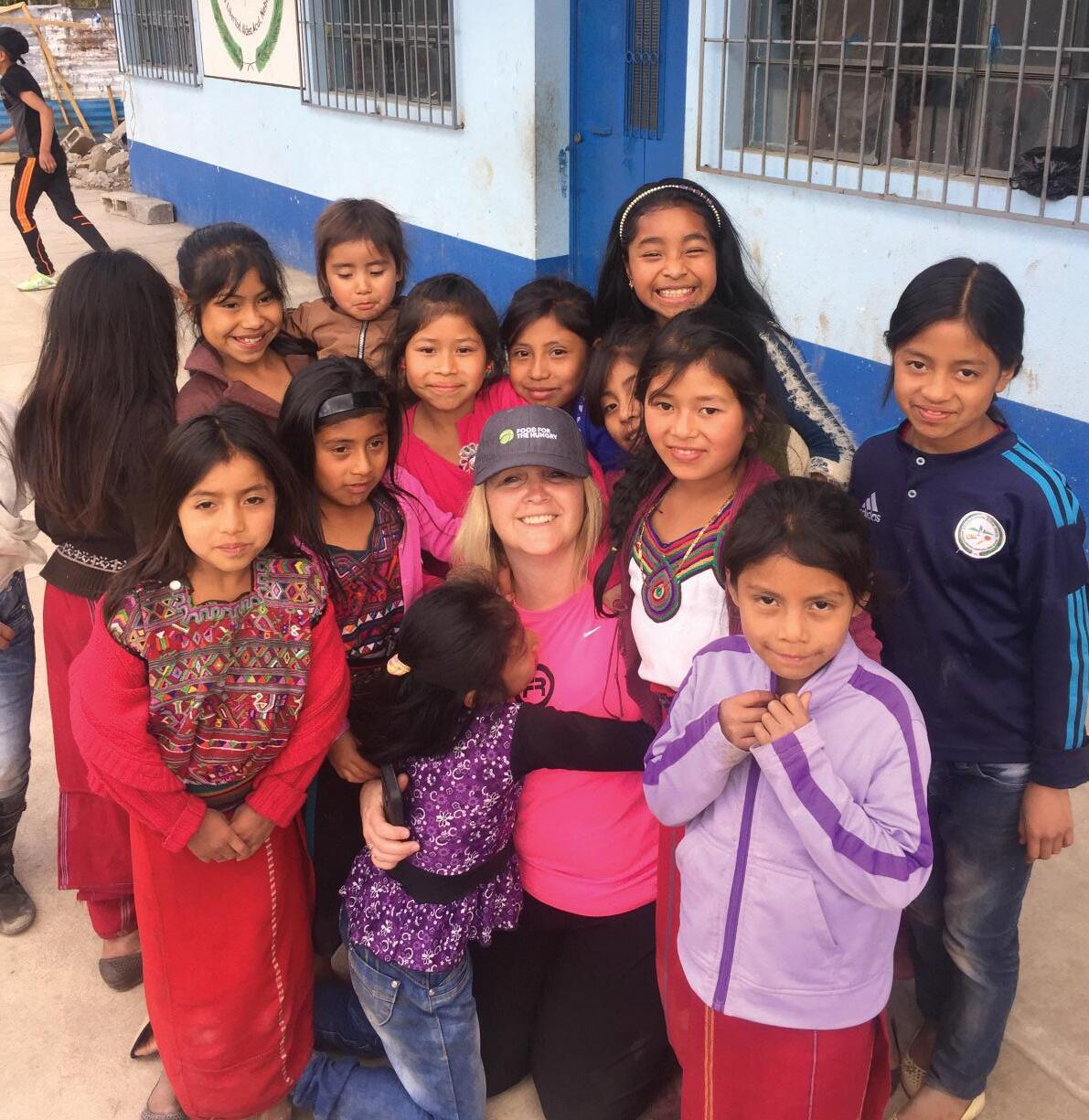
70 coffee beans, someone must handpick around 35 coffee cherries for your morning cup of coffee.
Andrew suggests an exercise to help this sink in. “Stick your hand into a bag of coffee, and pull out two beans and recognize that there was a family that picked it. Think about the process all the way through. Farming—Picking— Processing—Transportation and Export—Roasting. What matters most? How little I can pay along that whole chain? Or does justice matter in what I can get in my cup in the end?.” These questions awakened a new ethos of equity and justice at New Life Church.
The relationships involved in this story include the people of Acul, Guatemala coffee farmers and their families, and the
Lead Pastor Ken Nettleton and expert coffee roaster Jason Horn.
7 FHCANADA.ORG
Darlene enjoys a break and a hug while hosting games and lessons for the kids.
New Life Church community, including former pastor and New Life member Jason Horn. When Jason sensed a call to work as a coffee roaster he did not have all the quali fications needed for the venture, and also did not know how deeply coffee would connect him with mission. But God took his passion, curiosity, and obedience, and made his journey with coffee an integral part of how New Life honours their relationship with the families of Acul.
That handful of beans picked in the front yard of Andrew MacDonald’s sponsor child has grown exponentially into over 3,000,000 individual coffee beans! New Life now imports 1,000 pounds of coffee annually from a farm near Acul. The coffee is then roasted by pastor-turned-coffee roaster Jason Horn, and sold through their Brew Life Cafe, a previously underused corner of their church turned coffee bar. Each year this relationship provides over $2,500 in support for FH programs in Acul. This farm-to-cup-back-to-farm cycle is both a practical and metaphorical example of how New Life is living out their calling as a community passionate about seeing the kingdom of God made evident here and now.
While coffee is a significant part of the story of New Life, it would be selling them short to identify them as The Coffee Church. There is much more to their story. Through Food for the Hungry, the congregation sponsors 138 children in Guatemala, with whom they regularly visit and communicate. At home on Vancouver Island, they attentively care for and build relationships with people on the margins in their community through a furniture bank and support of a local drug and alcohol rehabilitation centre. They’ve also been getting to know their indigenous Cowichan neighbours for the past 12 years. New Life has been awakened to what it means to be followers of Jesus in all things, from the call to love our neighbours right next door to learning how to bring justice and equity to global commodity chains.
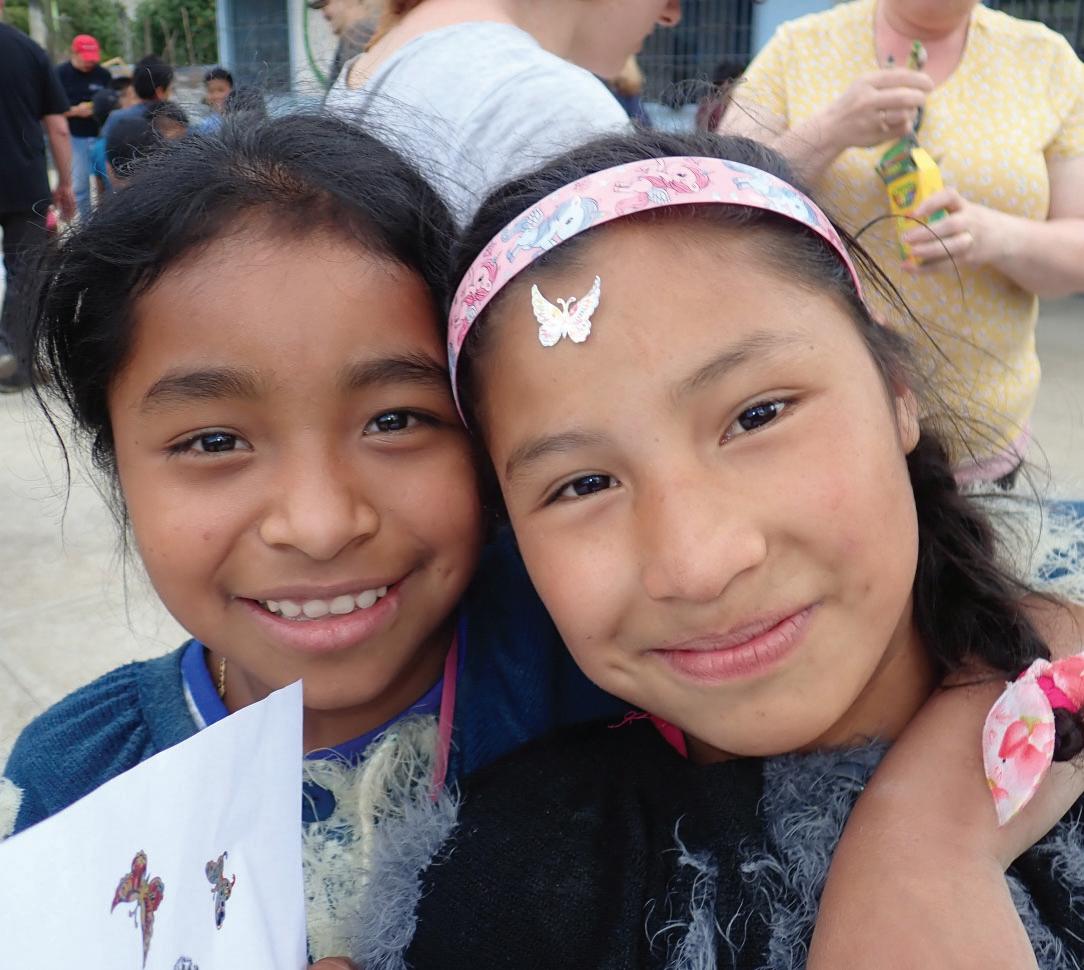
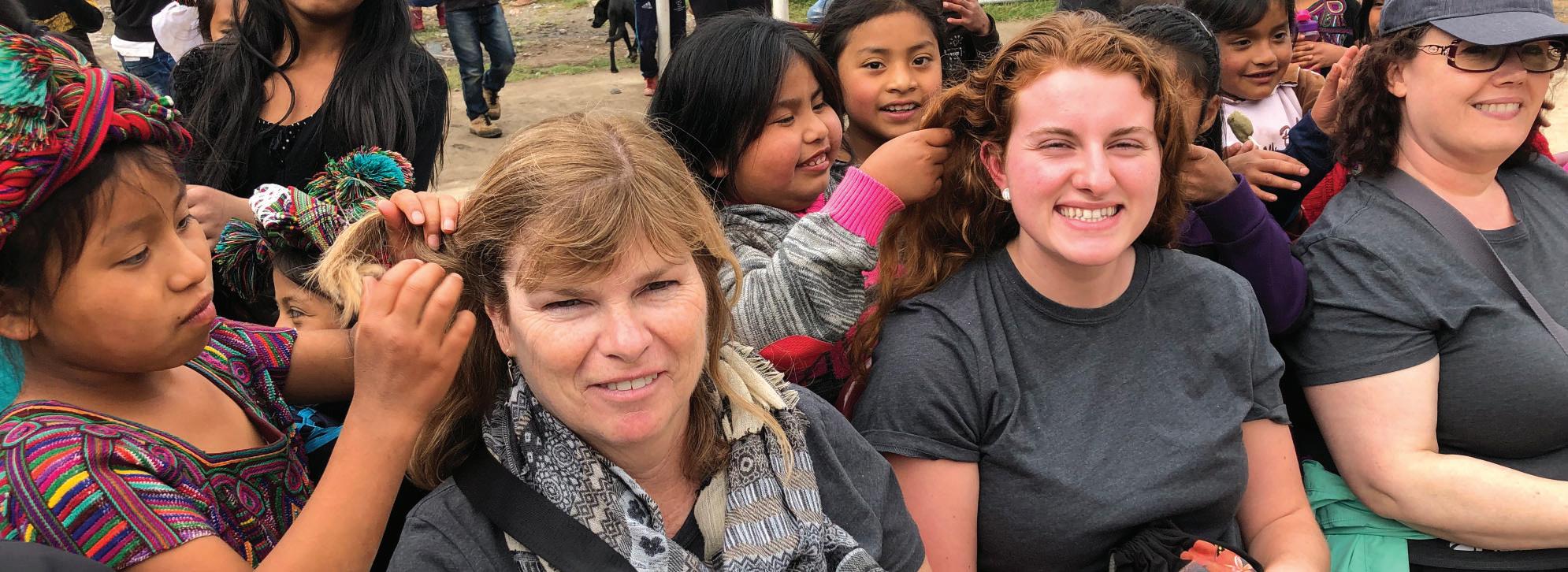
Pastor Ken explains the mutual transformation of New Life’s relationship with their friends in Acul this way: “As we pay attention to these issues we are transformed. A helps B...and A gets better. B is transformed as well. Coffee is the opportunity. As Christians what we are living for is to bring the kingdom, and the expression of the kingdom into the world.”
The development of the Brew Life Cafe, however, has not been without its challenges. Sourcing quality coffee from a farm close to Acul has been more difficult than expected. Finding volunteers for the cafe is not always easy. And then COVID-19 shut down the Cafe. This reality, however, made space for the church to remind themselves what this is about—relationships. Continuing to buy coffee online through the Brew Life Cafe has been one way to stay committed to the relationship. “We still have a relationship with Acul, even though as a worshiping community we are not meeting together and we are not able to travel to Guatemala right now,” Pastor Ken af firms. “We have a relational responsibility to this community. We are learning generosity.” New Life is ensuring there is enough for everyone involved in the coffee resource chain—the farmer, the farmer’s family, the land the coffee is grown on, the volunteers at the church, the coffee roaster. Yes, quality and cost are important.
8 ISSUE 28
Upon arrival at Acul’s primary school, Gillian, Drew, and Michelle and the rest of the team were promptly given fresh hair-dos to welcome them.
But so is the name of the farmer’s children, how many pigs the family own, and the favourite soccer player of the farmer’s son.
For the communities and families that FH partners with around the world, coffee is an integral piece of both their economic and cultural fabrics. This is true in Guatemala, as well as Ethiopia, Rwanda, Burundi, and Uganda. Around the world FH is helping coffee farmers build greenhouses for coffee plants, improve quality and yields, maximize connections to markets and co-ops, while also providing crop diversi fication training to alleviate food insecurity brought about by climate and economic instability.
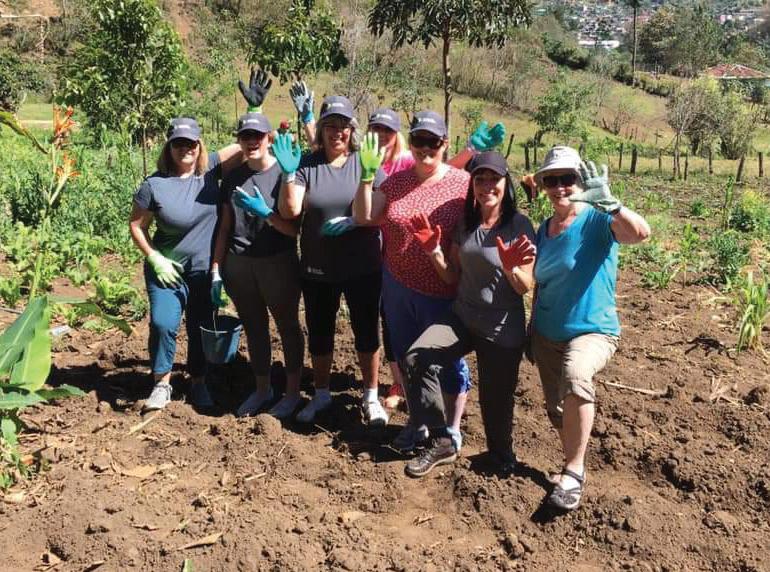
New Life Church’s courage is seen not only in their actions, but in their patience as well. The leadership attributes their partnership with FH to their deepening conviction that development, when done well, is about relationships first, rather than a focus on “doing”. Placing assumptions to the side, this courage and trust allows relationships to come first.
When asked why another church might consider partnering with

Would you like to learn more about how you can start a conversation about a community partnership for your church?

Get in touch with Jim Heuving, National Church Engagement Lead, at jim.heuving@fhcanada.org. He’d love to chat over coffee! (Sorry, we had to say it.)
WORKSHOPS ON YOUR RELATIONSHIP WITH
OTHERS
SELF GOD CREATION
Food for the Hungry, coffee roaster Jason Horn offers this: “I love how the local people, their burdens, their passions, their dreams, are the things that are developed. Their resources coupled with our resources helps them accomplish something they want, not what we want.” Attentive hearts, creativity, and a commitment to the long path of relationship are providing hope, flourishing, and a future in both Duncan, BC and Acul, Guatemala. MAY
FEATURING KEYNOTE SPEAKER DANIELLE STRICKLAND
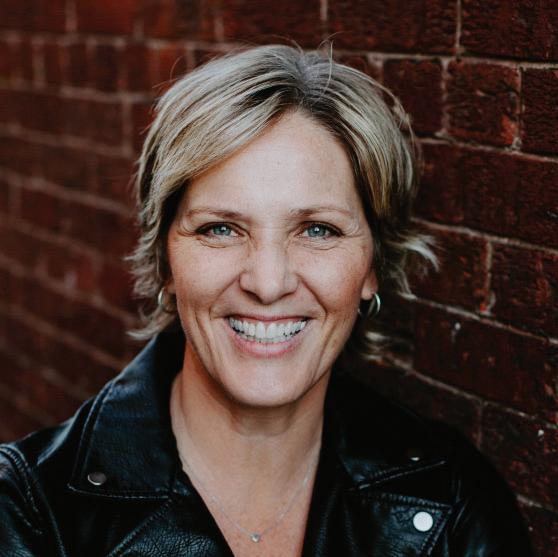
Poverty isn’t just about stuff; it’s complicated. Poverty is about relationships that are broken, and it affects us all. But real change is possible.
SCAN ME
fhcanada.org/flourishing
For workshop descriptions, speaker bios, schedule, cost, and more!
7TH & 8TH VIRTUAL LIVECAST UPROOTING POVERTY, PLANTING HOPE.
Q: What is your specific role in the community as a Leader Mother?
T: Prior to the pandemic*, we met once a week with the FH facilitator to receive health and nutrition training specifically on topics such as essential care for pregnant women and newborns, exclusive breastfeeding, early infant stimulation, and others. After receiving training, we replicate it to our neighbourhood circle with the objective that the children of our community grow and develop healthily according to the heart of God.
Q: Why did you choose to become a leader in your community?
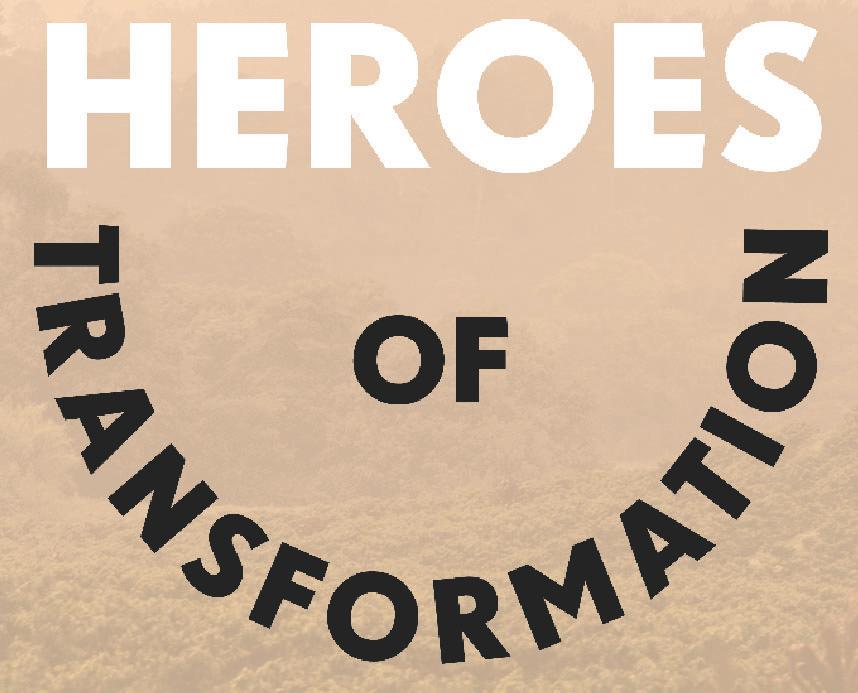
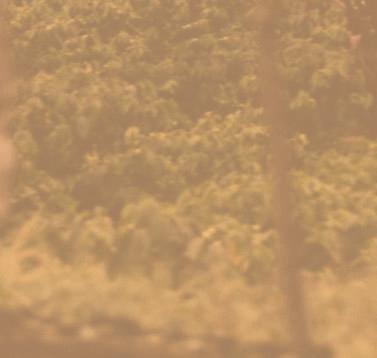
T: I feel that it is necessary to participate and contribute for the development of my community. In the past there was no opportunity to participate in leadership due to cultural issues, but thanks to FH training there has been a great change in the community and in the integration of leadership. Together we can lead; God has given us the ability. I know that holding hands we are stronger and achieve a community without malnutrition, free of violence, and flourishing.
Q: What do you love most about your role?
T: Being part of a group of volunteer mothers, receiving demonstration training from FH through flip charts, and then sharing it with my neighbours has been a great satisfaction for me. Knowing that families practice good health and see their children as the image and likeness of God fills me with
María Tina Sánchez Raymundo is a 33-yearold single mother living in San Juan Acul, Guatemala. Raised in a large family (seven siblings!), Tina grew up helping out on her family farm. She currently works as a cook in her community’s school and has volunteered as a Leader Mother with FH Guatemala for the past eight years. Considered by her friends to be “participatory, committed, determined, and responsible”, Tina loves teaching other mothers how to keep their families healthy and safe.
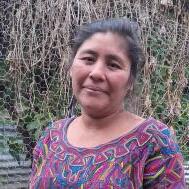
great joy. I like to learn and I plan to continue studying. Being a leader in my community has given me a lot of strength to continue with the Leader Mother work and I try to inspire other mothers to get ahead regardless of adversity.
Q: What does your typical day look like?
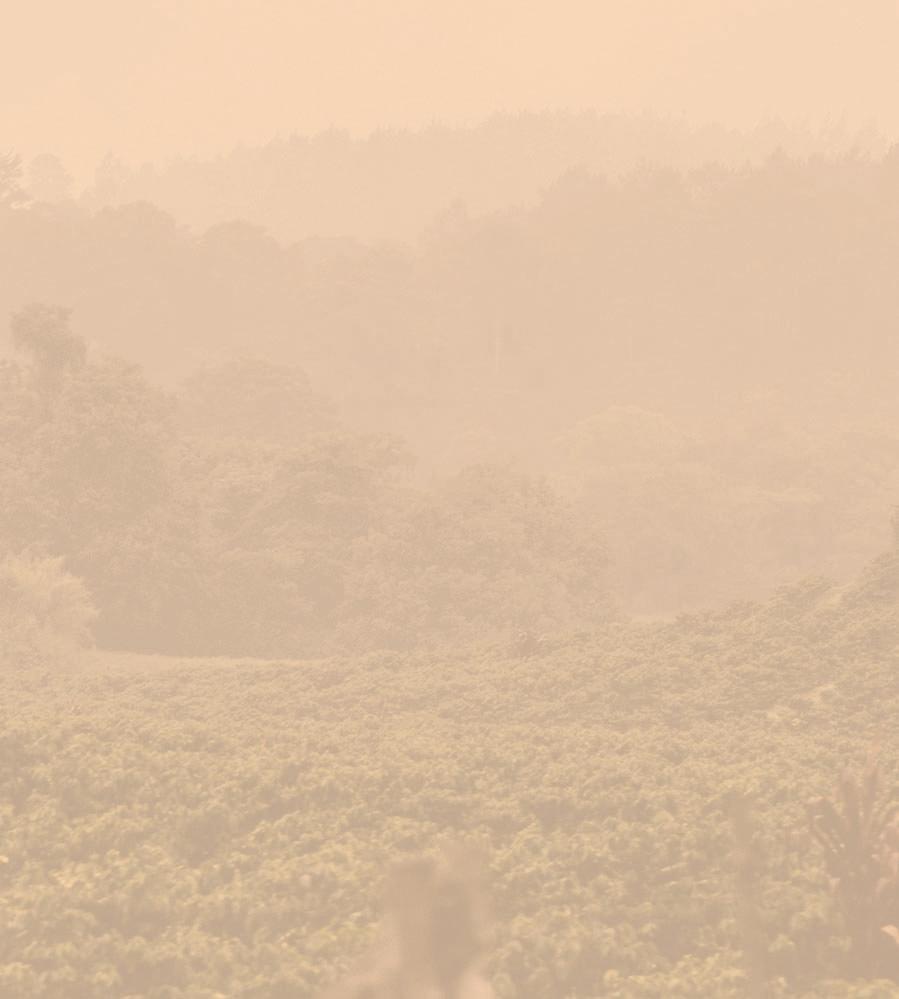
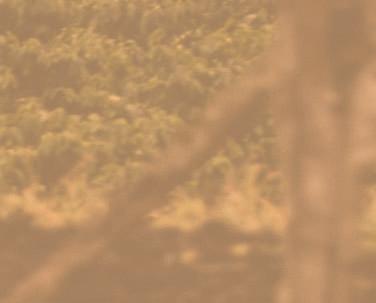

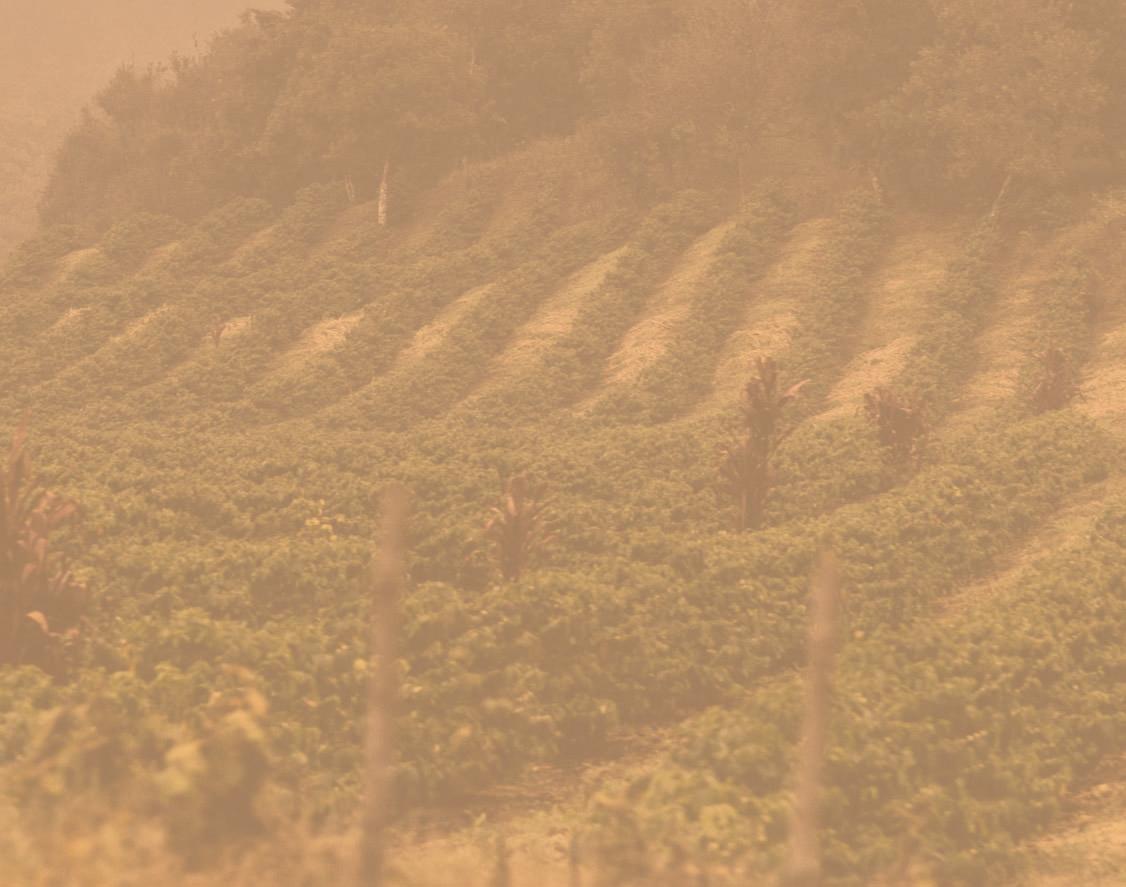


T: When I get up, I prostrate myself on the edge of my bed to pray before doing my planned activities. Then I prepare breakfast for my daughter and later I clean the house. I take a couple of hours to knit before I prepare lunch for myself and my daughter. In the afternoon, I visit my parents. On some occasions, FH calls me to receive training on a new food recipe. I read my flip charts to get ready to share it with my neighbours. I read the Bible, and before dinner I help my daughter do her homework. I also like to weave güipil [traditional Guatemalan cloth] to sell or make it for my daughter.

” “ “
MEET TINA
*Due to COVID-19 lockdown measures, Leader Mothers currently receive health lessons from FH facilitators via phone messages and share them with their neighbours individually instead of meeting in groups.
I am a person with courage with a desire to learn many things. I like to cooperate with those most in need, taking into account what the Bible says that we have to help each other.
10 ISSUE 28
— Tina, Guatemala
Q: What is the hardest part of being a Leader Mother?
T: The most difficult for me has been to share about health issues with families who do not want to listen. I have met some who have treated me badly to the point that they close the door saying that I should look for a job. The pandemic has also been a very dif ficult issue for me, but with God's help we will move forward.
Q: Describe a time when your work in the community made a real difference for a family.
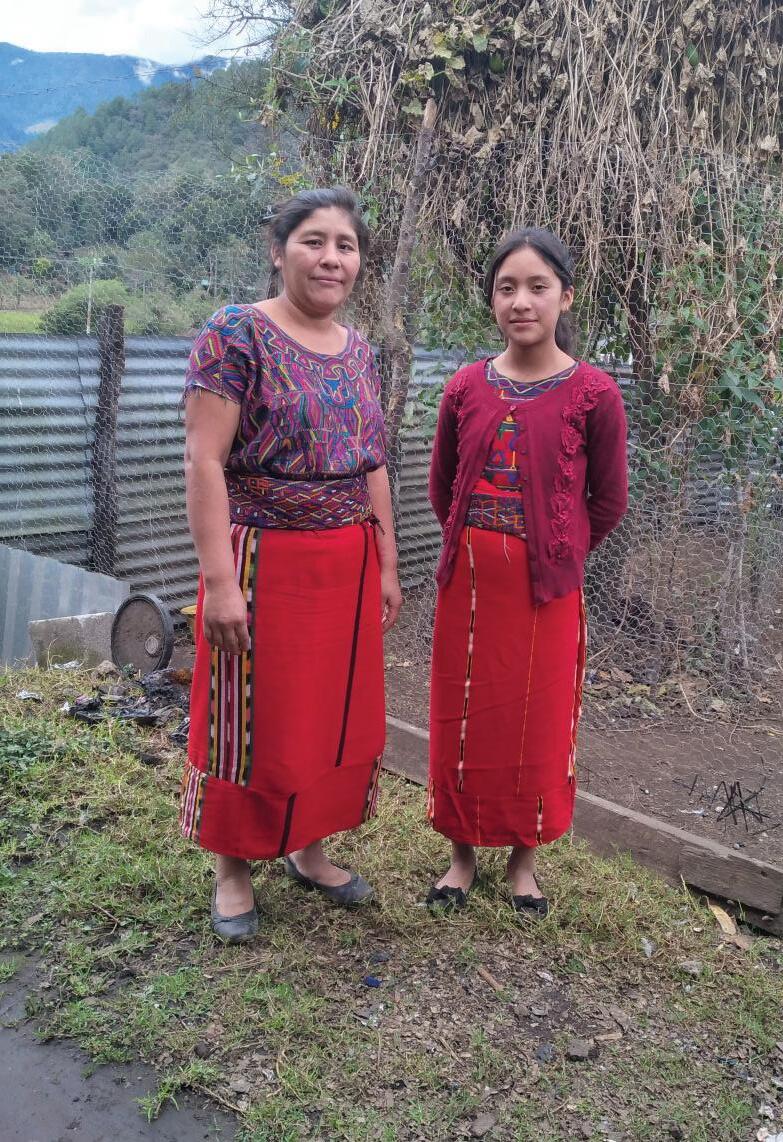
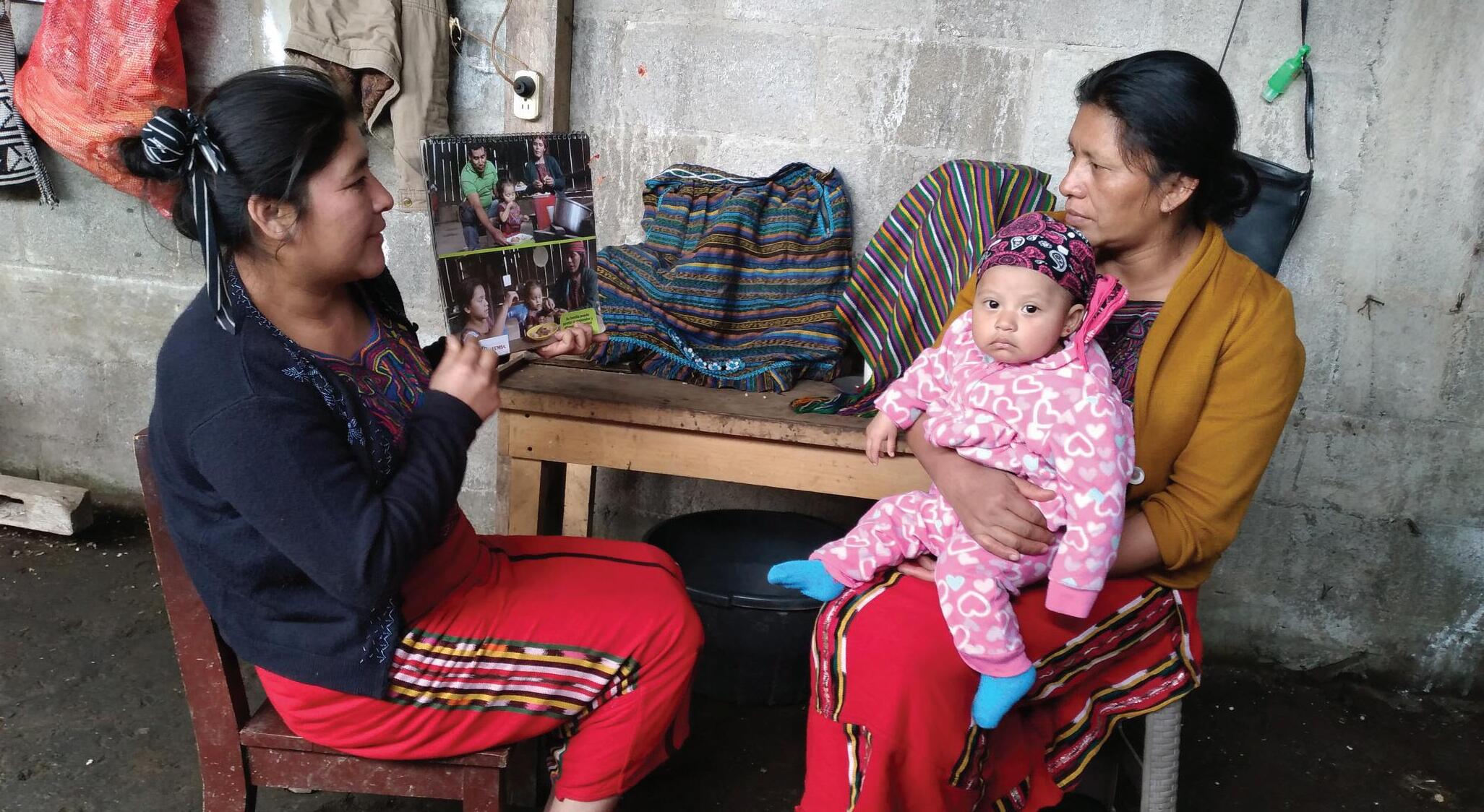
T: I was able to follow up closely the case of two children who lived in my community. They had malnutrition but they recovered and reached their proper weight. At that time, we were following up with them through visits with health personnel and FH staff. We thank God for these recovered children.
Q: What is one of your most memorable times with FH?
T: To see the culmination of one clinic with three separate wards to treat patients based on their needs. With that I am sure pregnant women can be treated comfortably and safely. The clean-up walks we carried out with my neighbourhood circle also caught my attention—that way we kept a clean and safe community.

”
Teaching through pictures allows Leader Mothers to reach more people with life-saving health messages. 11
Tina is setting an example for her daughter to engage with and serve her community.
please pass the
Sausages
HOW I LEARNED HOSPITALITY FROM "THE POOR"
Written by Eryn Austin-Bergen
I grew up in the 1980s in a small town on the north bank of The Gambia River. My family was the only foreign family for miles around; we were the first white people many children in the area had ever seen. There wasn’t a lot of electricity or running water. People got around mostly on foot, bicycle, or horse cart. The pace of life was slow. The majority of the population fit well below the poverty line.

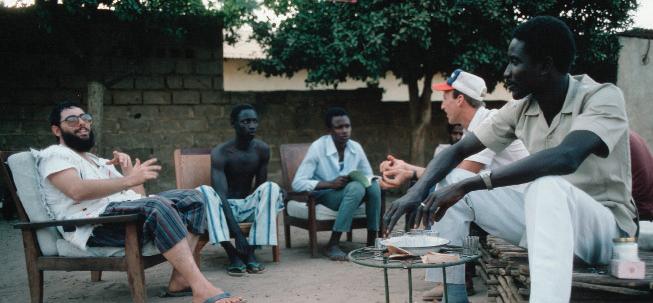
Most families still lived in rural villages and practiced subsistence farming (mostly peanuts) to make a living. Education was sparse, healthcare was dodgy, and people ate only two meals a day, or less during the “hungry season”. They were who we might call “dirt poor”.
Everything is dark inside.
It takes a few moments for my eyes to adjust coming in out of the blazing afternoon sunshine. I shuffle into the small, mudbrick room and am directed to sit on an oversized chair of carved hardwood and foam cushions with worn blue and white floral fabric covers. Even though I am just a child, I am given a place of honour next to my parents. As my eyes grow accustomed to the dim, filtered light I start to see the room—old, yellowed photographs pinned to the walls, a wooden table with plastic cups and bowls. The floor under our feet is hard-packed mud, tidily swept clean just this morning.
Our host calls a young boy to him, presses a few coins into his hand, and tells him to run quickly and fetch sugar and tea from the local bitico (corner store). Hot coals, a pitcher of water, and a tea set are brought in. I can hear the voices of women calling outside and the sound of a struggling chicken. Lunch is being prepared. In an hour or so, we’ll be gathered around a bowl of food—rice, chicken, sauce—a feast prepared just for us.
But that didn’t stop them from extending such lavish hospitality as to shame the average wealthy westerner like me.
Deep cultural values of sacri ficial generosity and caring for the stranger dictated that when my family showed up in a village, our host went above and beyond to care for us. Cool water was provided to parch our thirst, furniture (often their best chair from inside) was placed under a shade tree so we could rest from our journey, tea and sugar were purchased to make us feel comfortable, and cook- fires were lit to prepare a meal to satisfy our hunger. A good host would even slaughter a chicken to honour our presence—a major financial sacrifice!
But this wasn’t treatment only we received as foreigners. Local visitors were also fed and cared for. From the little they had the hosts gave everything.
The other night my husband and I offered to bring dinner to some acquaintances who are in the process of packing up their entire lives and moving across the world. We’d already committed to bringing grilled meat, so I was sorely disappointed when I opened our freezer and found only one package of
“As westerners, our fierce individualism and independence can sometimes result in a poverty of hospitality.”
12 ISSUE 28
— Eryn Austin-Bergen
“bangers”. We had two other packages of a different kind of sausage, but I hesitated. I counted and recounted the bangers, trying to figure out if we could make them stretch to feed us all. It wasn’t that we didn’t have enough meat in the freezer to bring more over; it was that I didn’t want to.
I didn’t want to share our organic, grass-fed, very expensive meat. I wanted to keep it for ourselves. We live on a tight budget and we only get to buy so much fancy meat a month. When it’s gone, it’s gone. I didn’t want it to be gone.
I thought about going to the store to pick up cheap meat. I thought about making a big salad and adding more potatoes to the pot already boiling on the stove. I stood over the counter, staring at those frozen sausages, racking my brain for a way to keep them for myself. Then I remembered my childhood, my heritage, and I was ashamed. I remembered all those chickens slaughtered for me, all those times a family probably went without a meal so I, their guest, could eat. I quickly pulled out a second package of meat and set it to thawing.
In that moment I realized “the poor” can outdo us “wealthy ones” any day of the week when it comes to sacri ficially sharing food. While they lack material resources, they are profoundly rich in hospitality.
Perhaps it’s because they often live in shame/honour cultures where it is shameful for a host to not go above and beyond to honour her guest. Perhaps it’s because they know what it’s like to be completely dependent on the compassion of others for survival in a harsh environment. Or, perhaps it’s because their own experience of the awful, gnawing reality of true hunger means they don’t want that for any other person, ever.
Ironically, we who are wealthy in food resources can often be poor in sharing. As westerners, our fierce individualism and independence can sometimes result in a poverty of hospitality. We never want to be thought of as weak or needy, so we refuse the lavish kindness of neighbours. We focus on our individual survival which causes us to calculate how much we need (or want) and subtract that from what we have in order to determine whether or not we can “afford” to offer hospitality to another. When we do extend ourselves, it’s most often for those we already know and love, rather than for strangers.
I’m humbled and grateful I had the privilege of growing up among the materially poor. It set my hospitality compass. Last week when I was leaning towards saving the best for myself and my family and shortchanging our new friends, that compass gave me a sharp turn and pointed me relentlessly in the right direction—to follow the example of those rich in hospitality and sacrificially share my food.
ABOUT THE AUTHOR

Eryn grew up the child of missionaries in The Gambia, West Africa, in the early 1980s. As an adult working for FH Canada, she encountered “When Helping Hurts” by Brian Fikkert and applied his teaching to reflect on childhood experiences in which “the poor” taught her life lessons that reveal the poverty of “the wealthy”.
Ready to shake up the way you think about poverty? Contact us to learn more about a variety of educational workshops for churches, businesses, and small groups! education@fhcanada.org or fhcanada.org/workshops
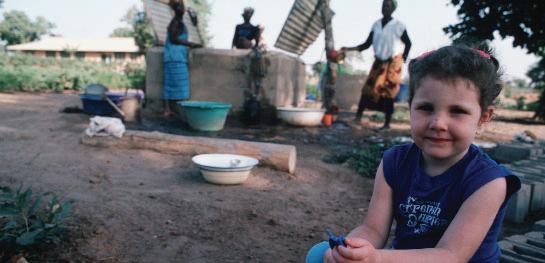 Eryn as a young child sitting in her father’s project garden managed by a group of local women.
Eryn as a young child sitting in her father’s project garden managed by a group of local women.
13 FHCANADA.ORG
INGREDIENTS—Rolls
• 500g pork belly (boiled, sliced)
• 400g shrimp (de-shelled)
• 100g vermicelli rice noodles (uncooked)
• 5 cups lettuce (shredded)
• 3 cups mung bean sprouts
INGREDIENTS—Fish Sauce
• 1 ¾ cup water
• ½ cup vinegar
• ½ cup fish or oyster sauce
INSTRUCTIONS
Cambodian Kuong
Fresh Spring Rolls with Fish Sauce
Submitted by Silean Seng and Channalen Koun, FH Cambodia

Kuong is enjoyed by Khmer people across Cambodia as a lunchtime snack, street-food treat, and party platter favourite—some people even eat it for breakfast! It’s a great way to jazz up leftover meat. Best of all, it’s packed with tasty ingredients and is equally delicious and nutritious.
• 2 cucumbers (julienned)
• 18 sheets rice paper

• 2 cups fresh herb mix (cilantro, mint, celery leaves, rat-ear*)
*Rat-ear—pepper elder or man to man—is a tropical herb with a broad leaf and mustard-like odor. Substitute with your choice of bitter herb.
• ¾ cup white sugar
• 4 cloves garlic (minced)
• 1 red onion (diced)
1. Prepare the pork. Cut away any large portions of fat from the pork. Boil pork in salted water for about 60-90 minutes until fork-tender (a fork slides easily in and out of the meat). Or, slow cook the pork for 6 hours on low. Drain and set aside to cool.
2. Whisk together fish sauce ingredients, minus the peanuts. Set aside to let flavours blend.
3. Prepare the shrimp and noodles. De-head and de-shell the shrimp if needed and boil in salted water for about 3 minutes until cooked through. Remove tails and cut shrimp in half lengthwise. Place rice noodles in a heatproof dish and cover with boiling water; let
• 1 tbsp salt




• 1 chili pepper (thinly sliced)
• ½ cup peanuts (chopped, roasted)
stand until soft (3-4 minutes) then drain and set aside.
4. To assemble the rolls, dip one rice paper in warm water to soften. Layer ingredients in the centre of the soft wrap—lettuce, noodles, herbs, mung bean sprouts, cucumbers, pork, and shrimp. Then wrap by pulling two sides up slightly onto the ingredients and roll into a small log.
5. Serve rolls fresh and cold (or refrigerate for up to 2 days). Pour fish sauce into small individual bowls for dipping and sprinkle in chopped peanuts. Makes 15-18 rolls.
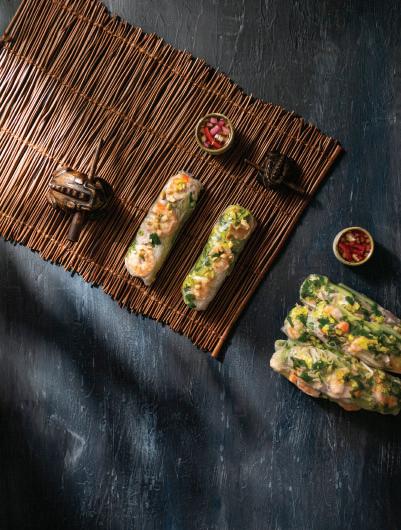
14 ISSUE 28
Channalen Koun
BANGLADESHI NAKSHI PITHA

This popular traditional and ornamental Bangladeshi appetizer is a crowd pleaser. Often served at festivals or while entertaining guests in villages, these fried rice cakes make for the perfect savoury or sweet, crispy and flakey (and beautiful) treat. It’s also fun to make with kids!
INGREDIENTS
• 1 ½ cup water
• ½ tsp salt
• 1 cup rice flour
• ½ tsp cardamom (finely crushed)
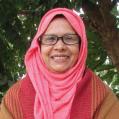
• 1 large toothpick (or thorns of a palm tree) for crafting a design
Alternative: A sweet Dessert
• ½ tsp anise (finely crushed)
• ½ L cooking oil
• 1 cup sugar• ½ cup water• 1 tsp honey• 3 pods cardamom
INSTRUCTIONS
1. Bring salted water to a boil. Mix flour and spices. Slowly add dry mix to boiled water to make a dough, stirring constantly. Lower the heat and mix out the lumps using a wooden spoon. Knead well. When thickened into a smooth dough, remove from heat, cover, and let rest for 10 minutes.
2. Using damp hands, divide the dough into 6 even portions. Roll into balls. On a lightly floured or non-stick surface, press into ½ inch thick flattened cakes.
3. With your finger, lightly spread a few drops of oil around the top of the cake. Using a toothpick or other slender tool, draw a design into the dough cake. Traditional designs mimic flowers or leaves, repeating lines and curves in tight patterns. Contemporary designs use cookie-cutters.
Cover with a tea towel and let the dough cakes rest to dry for 1-2 hours.
4. Heat cooking oil. If using a deep fryer, heat to 350F. If frying on the stove, heat oil until bubbles form around a dry wooden spoon when submerged in the hot oil. Fry cakes in the oil until golden brown. Remove and dry using paper towels.
5. Serve hot. Makes 10-12.
Alternative: A Sweet Dessert
Make a syrup by dissolving sugar into water, then add honey to avoid crystallization. Add cardamom pods for flavour and simmer on low for 2 minutes. Dip nokshi pithas and coat evenly on both sides.
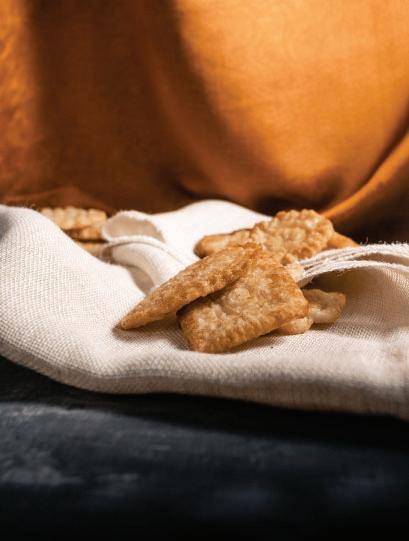 Sneha ReddyNaxma Akhtar
Sneha ReddyNaxma Akhtar
FHCANADA.ORG 15
5b.
Just start.
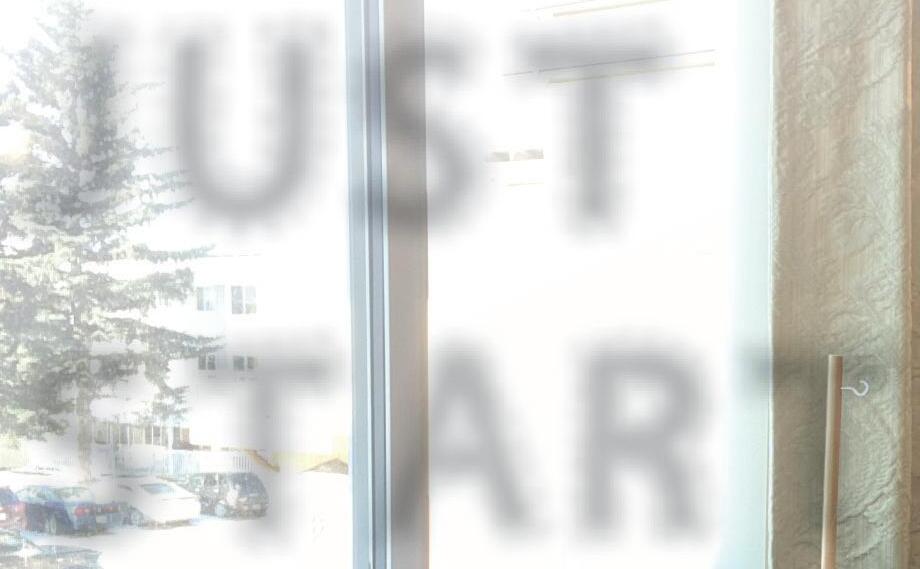
This is Hannelore Ponto’s advice to anyone wondering how they can make a difference in alleviating poverty. Hannelore’s story—a woman not afraid to step out into new things—just might encourage you to start something new while making a difference.
What is Hannelore up to? We recently had the privilege of chatting with this joy-filled and vibrant woman. Hannelore has been sewing masks since COVID-19 hit Canada in March 2020. She has made almost 400 masks and raised $400 for Food for the Hungry (FH) Canada!
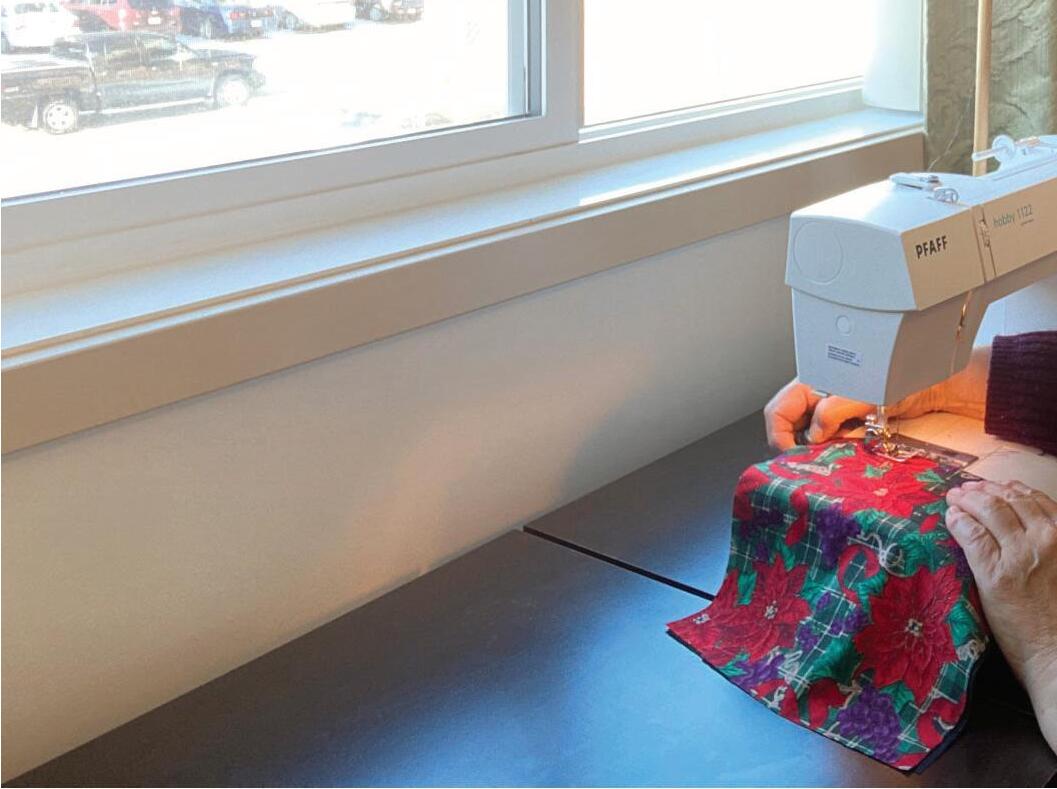
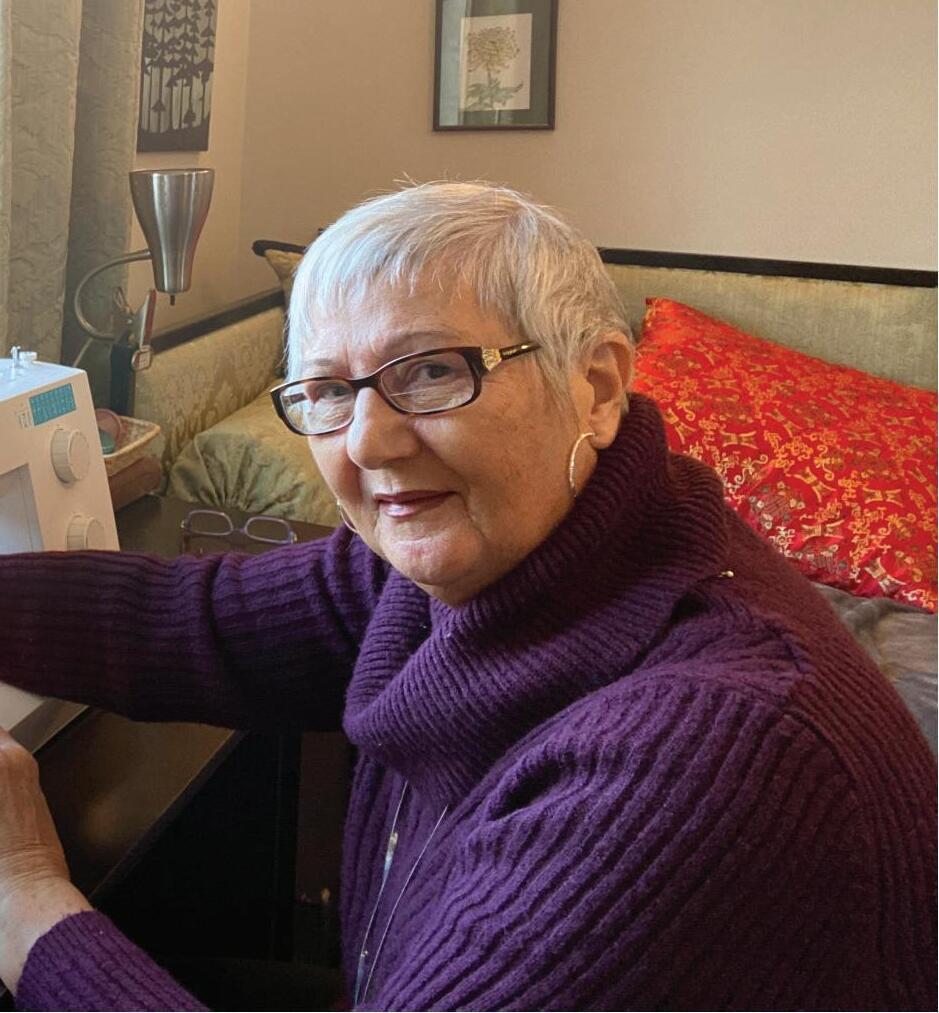
It was around the time her husband passed away in 2001 that Hannelore first learned of the work of FH Canada. She was invited on a 10 day FH trip to Peru to experience development work first hand. This trip was, as she enthusiastically described it, “a dream come true.”
Hannelore Ponto is a wonderful example of the abundant

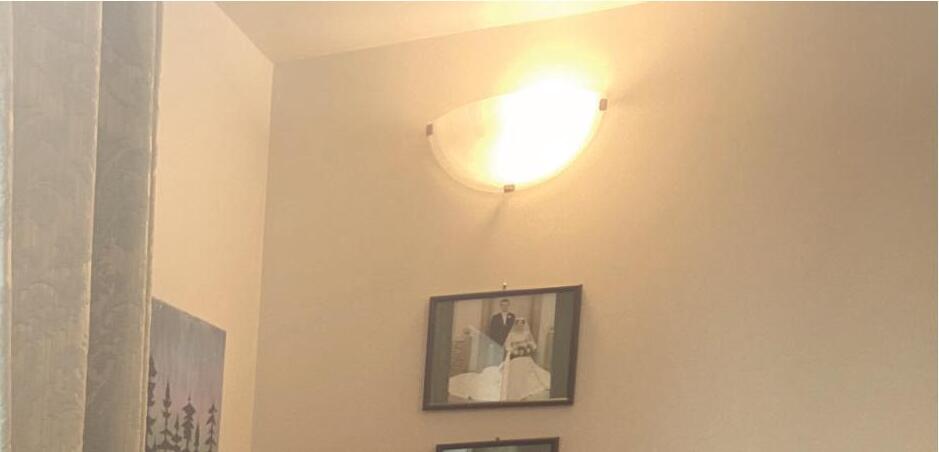
and flourishing life. A mother of three and retired bus driver, she also taught piano lessons, Sunday school, and bus safety workshops all across the massive school district of Caribou, as well as ran a mid-week children’s Bible program out of her house. And if this wasn’t enough, she also produced a Christian TV show for five years on community television in Williams Lake!

These days, by using her skills and passion for sewing, Hannelore just might be making someone else’s dreams come true as her support of FH helps communities move from stuck to thriving.
MJ: Hannelore, how did you end up making masks and raising money for FH?
HP: Well, I never intended to raise money. In fact, I don’t like asking for money, but sewing masks is just something I can do and that's how I ended up here! I was making scrubs for my daughter, who is a LPN in B.C. earlier this year, and then COVID came
16 ISSUE 28
Interviewed by Mike Janz
along and I had the skills to make masks. I started making them for family and friends. Just giving them away.
One day a friend offered me $20 for a mask, and I said “No way!” So the friend said I should pass the money on to my favourite charity. I now suggest that in lieu of payment I will take donations for Food for the Hungry.
MJ: You must have some sewing experience. Where did you learn to sew?
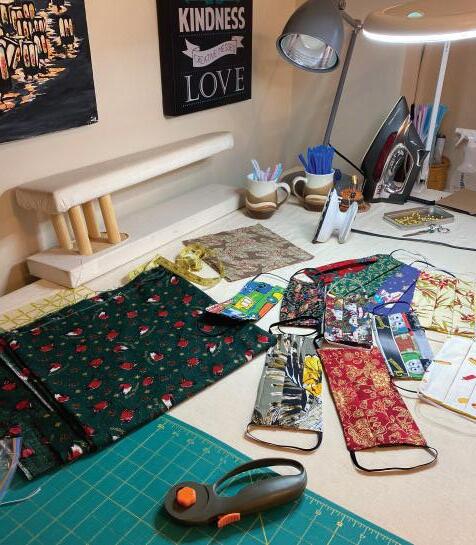
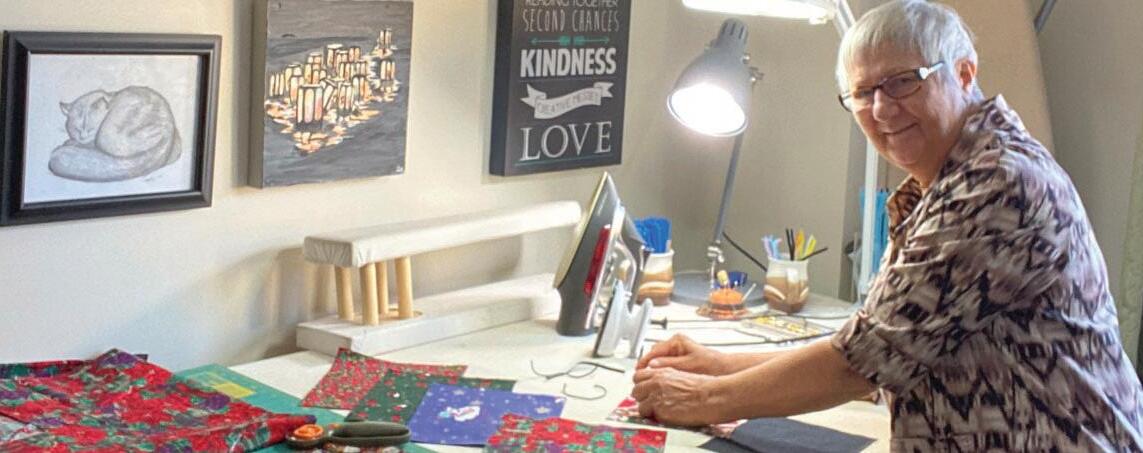
HP: I am actually a trained couturiere. When I retired I wanted to develop some new skills, and I took classes at Ecole Holt Couture in Calgary [a school of sewing and fashion design dedicated to teaching the fine art of haute couture sewing]. I graduated at the age of 71 from a four year program.
MJ: So, these masks must be pretty fancy then!
HP: (Laughing) Hah!, No, they are just masks. But I do have fun with them, using Halloween and Christmas fabrics to make them seasonal.
MJ: What would you say to someone who is wondering how they can help others? Someone who isn’t sure where to start?
HP: Just start! It doesn’t matter if you are scared or not scared. Just jump right in and open doors. When a door opens
I just jump right through it! We can often end up not doing the right thing because we just don’t start. So, I guess the best encouragement I can give is to just start.
Food for the Hungry recently checked in with Hannelore and her mask making venture as we enter into 2021. Due to some health issues she had to take a break from sewing for a few weeks, but is now on the mend and ready to once again get out her needle and thread. In fact, the morning that we spoke with her she had met a neighbour at the mailbox who handed her another $20 donation in return for a mask. In her bright and humble way her response was, “This is all so wonderful. I just wanted to make masks and give them away!”
“We can often end up not doing the right thing because we just don’t start. So, I guess the best encouragement I can give is to just start.”
17 FHCANADA.ORG
— Hannelore Ponto
GIFTS FOR CHANGE GIFTGUIDE
Courage TO Thrive

 /Written by Colton Martin
/Written by Colton Martin

For nearly 10 years, the Gift Guide has supported vulnerable families to start their own gardens or businesses, and provided school supplies for kids or clean water for the community. We’ve seen vulnerable families band together to help each other and share their knowledge, seeds, or newborn livestock. And this year, we’ve seen Canadians band together with families in partner communities like never before. This Christmas season alone, you helped raise a staggering $900,000 from the Gift Guide to support families. Thank you for your generosity which has delivered hope to these communities!
Phither’s School Supplies
Someone’s been paying attention in class! Seven-year-old Phither has been attending FH’s High-5 program aimed at filling the lives of children with blessings, fun activities, shared Bible stories, and memorizing Bible verses. Phither especially enjoys playing different characters in the stories.
In Phither’s community, children haven’t always had the opportunity to learn this way. But thanks to generous Canadian donors who purchased School Supplies and Story Books from the Gift Guide, the little school in Phither’s community now has a myriad of opportunities that allow for new programs—like the High-5 kids club. Supporting these items not only provide books and pens, they also help fund programs that enhance learning in the classroom.
Phither’s parents have seen a change at home as well. Before participating in Ready to Play, it was difficult for Phither (like most children!) to remember his hygiene routines; he did not like to practice them, either. But when he watched the “Ready to play” lessons, everything began to change: “I like to learn with Elmo [from Sesame Street], through the music and videos. It is something that encourages me, and this has made me change my clothes by myself.”
Phither says, “I can take care of myself. I want to grow up very healthy; my brother has already given me clothes because it already fits me and says I am growing very fast!”
You can help vulnerable individuals and families when you buy from the Gifts for Change Gift Guide. There are over 35 items to pick from, whether it’s School Supplies, Clean Water, or a Sturdy Goat! Whatever you choose, it’s going to help families end poverty in their community!
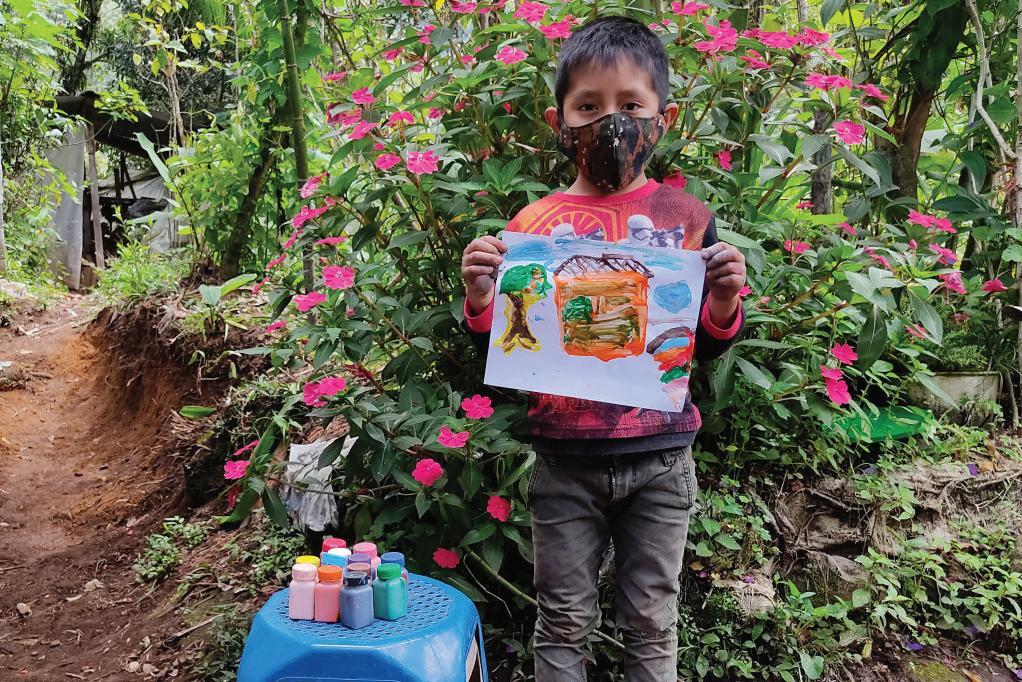 School Supplies from the Gift Guide help creative kids like Phither thrive at school.
School Supplies from the Gift Guide help creative kids like Phither thrive at school.
18 ISSUE 28
Belaynesh’s Mighty Cabbage

As a 45-year-old mother of four living in rural Ethiopia, it’s Belaynesh’s responsibility to feed her family. But it’s a struggle. Due to insufficient income, she wasn’t able to buy vegetables from the local market. Nor could she grow her own—she couldn’t access improved vegetable seeds and she didn’t have the experience to grow and cook a variety of vegetables. Her community long practiced mono-cropping grains—growing the same crop on the same plot of land year after year, taxing the soil and limiting nutrition.
“We were facing challenges and issues since we followed traditional agricultural practices and had poor agricultural knowledge, especially on vegetable production,” Belaynesh explains. “Children were much affected by malnutrition...and infectious diseases.”
A few years ago, a generous Canadian donor purchased Fruit & Veggie seeds from the Gift Guide. It was what Belaynesh needed to turn things around. It helped Belaynesh learn what she needed to grow a thriving garden with a variety of nutritious vegetables.
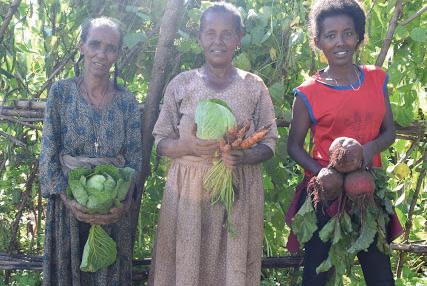
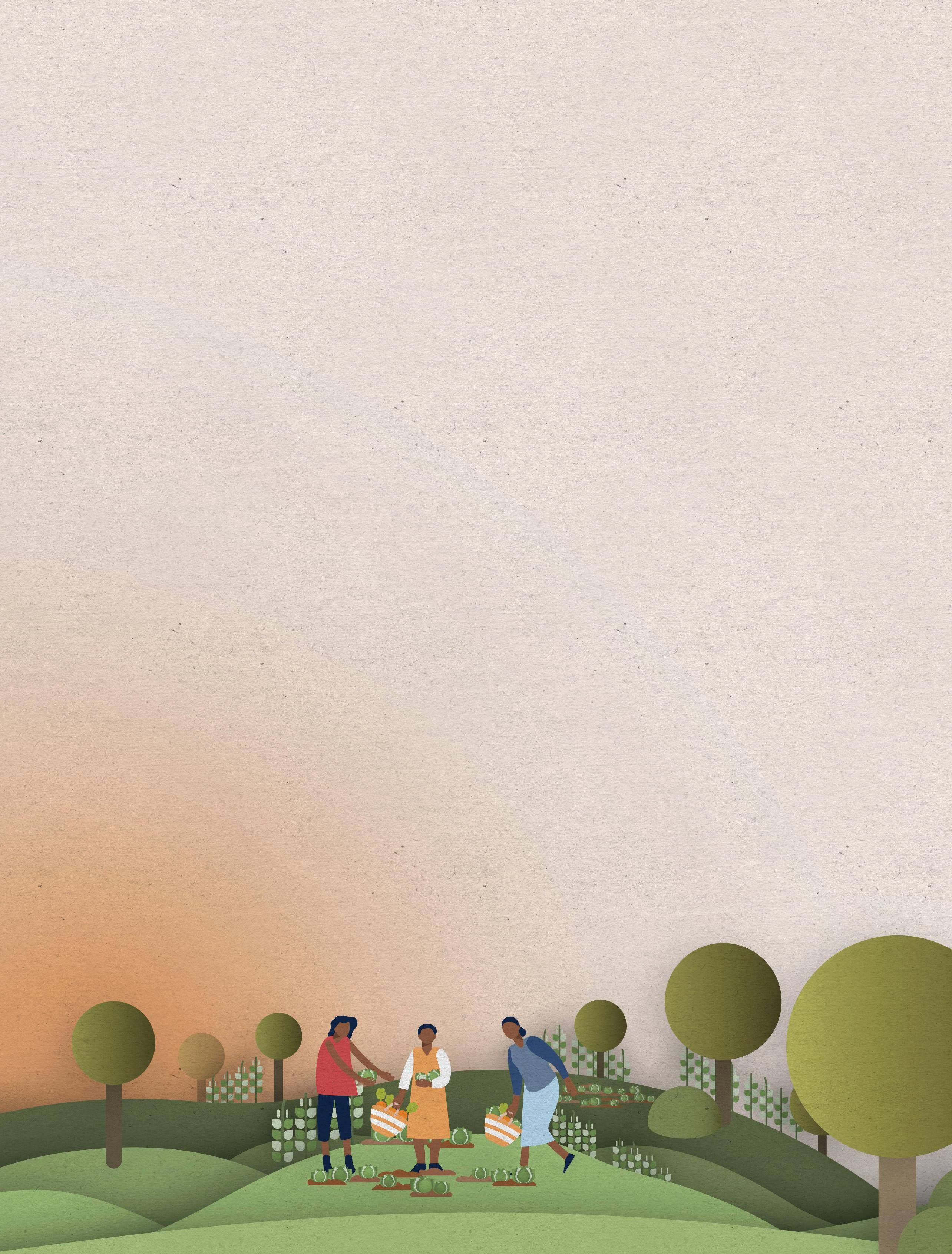
Belaynesh is relieved to be feeding her children not only enough food, but the right kinds of food to see them grow into healthy, vibrant adults. “My dream is to work harder and food secure my family. I also want to boost my earnings to send my kids to school properly,” she concludes.
Patrick’s Cow Called Canada

Patrick is a smallholder farmer living in the rural community of Nashisa, Uganda. He’s responsible for supporting his wife and nine children. There are no circumstances under which this would be an easy task! But in Nashisa, Patrick faced challenges particular to a community with material disadvantages. Lack of infrastructure, poor government support, inaccessible healthcare, lack of clean water, discouraged leadership, and few income-generating options to name just a few. “Things were very difficult,” Patrick shares. “Life was full of hopelessness; we were financially handicapped. We were ‘nobodies’ who mostly survived on one meal a day. Since FH came to our community, however, that was the beginning of transformation.”
When they received a dairy cow from FH, they were overjoyed and named her “Canada.” “This always keeps me remembering friends in Canada,” Patrick smiles. “I love this cow.”
From the one cow Patrick received from a Gift Guide purchase, he managed to give away two calves to neighbours in need. The mother cow has continued to calve regularly, and from her milk sales he bought a new cow. To date, Patrick’s small herd has grown to six cows.
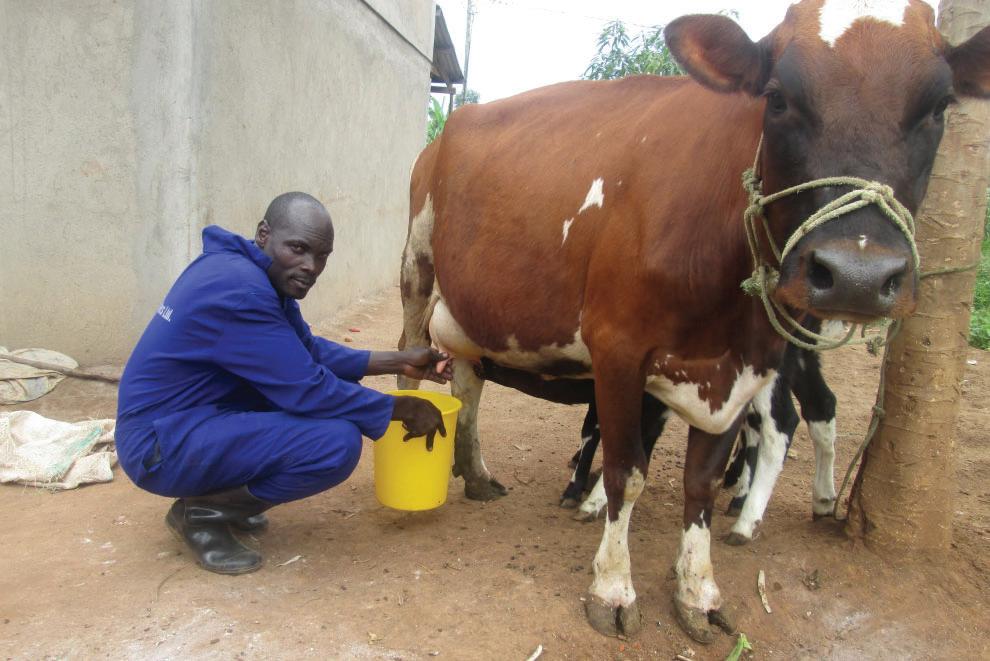 Eryn sitting in her father’s project garden managed by a group of local women.
With a dairy cow, a farmer can increase his family’s nutrition and income.
Eryn sitting in her father’s project garden managed by a group of local women.
With a dairy cow, a farmer can increase his family’s nutrition and income.
“This always keeps me remembering friends in Canada!”
19 FHCANADA.ORG
— Patrick, Farmer, Uganda
We’re the Mestons! An ordinary family living in Calgary, Alberta who love to see what God does when we give our whole selves to him for the sake of others. We’ve been married for 13 years and have three rambunctious kids—Ariah is seven, Judah is four, and Caius is an adrenaline-raising one-year-old. Like you, we work hard, love our family, serve our church, and try to help others. On our journey together, we’ve discovered a truth that brings deep joy and constantly shapes our family life. Ready for it? We can’t outgive God!
In 2017, together with our church small group, we helped organize a fundraiser called Kilometres for Kids to support a Food for the Hungry’s (FH) Soup for Kids campaign that promotes school lunches in Guatemala. It was an amazing experience! But it never would have happened if our journey in generosity hadn’t started much earlier.

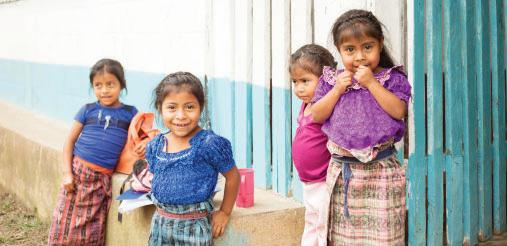
GIVING EARLY
I (Aaron) first heard about FH while going to a private elementary school in Three Hills, Alberta. A speaker shared about what they were doing and asked if anybody wanted to help sponsor a child. I was in Grade 2 or 3 and probably only eight or nine years old, but I thought, “Yeah! Of course!”. I had the privilege of growing up in a Christian family; my grandma
used to talk about missionaries, and I heard a lot about what was going on around the world. So it felt really normal to start donating little bits of money. My parents were totally supportive. They let us choose what to do with our dollar-aweek allowance, but they would say 10 percent of this—like a dime—is for Jesus. Growing up tithing is how I personally started practicing generosity and came to understand there are people in the world who have needs that are different than ours in Canada.
GIVING AS FAMILY
Aaron naturally brought this way-of-life generosity into our dating life, and then into our marriage. When we got engaged 13 years ago, we started sponsoring two kids together . We’ve

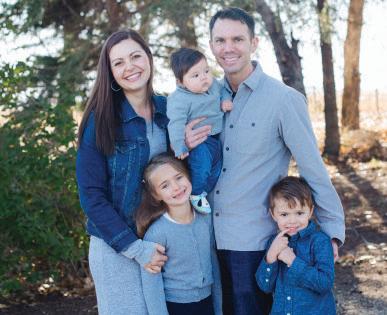 Written by Aaron and Kyla Mestons
Interview by Carissa Youssef Adapted by Eryn Austin-Bergen
Written by Aaron and Kyla Mestons
Interview by Carissa Youssef Adapted by Eryn Austin-Bergen
20 ISSUE 28
Kyla and Aaron with their children Ariah (right), Caius (middle), and Judah (left).
had a lot of experience since then with child sponsorship and I (Kyla) love it! It’s such a positive way to impact a child’s life. When I talk to people about child sponsorship, I tell them you will not notice this money leaving your wallet—when you’re blessing others you don’t notice that money going. But the impact it makes is huge and we see it in the letters from our sponsor children.
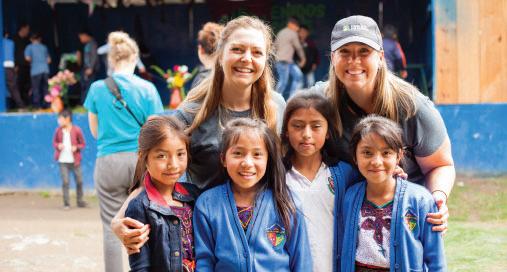
Hearing from the kids about how we impact their lives also puts a helpful perspective on hard times. Sometimes it’s just them saying they loved your letter and picture; or responding to a question about a Bible verse or Bible story; or explaining how they enjoy singing in church and are learning to play drums—all that normal life stuff. They’re just like any child. They’re so resilient and with a little bit of support they blossom.
GIVING AS COMMUNITY
In our church small group there are lots of people just like us. They have a heart to give actively and make an impact. A few years ago, we started talking about ways we could work together to help others. We started by organizing service evenings to support people in our community, like helping folks with household repairs. Then we thought, let’s try something a little bigger. We shared with our group about our longtime support of Food for the Hungry and their Soup for Kids campaign.
We definitely have a passion for feeding children. I (Aaron) think, as parents, the most important thing we do in our lives is take care of our children and provide for them. In Canada, it’s easy to take for granted being able to feed our kids nutritious
meals. But not every parent in the world has the opportunity to do that. So I love what FH and the Gleaners are doing through Soup for Kids—recognizing that painful reality and inviting us to partner with those parents. I think about the level of stress that comes with not being able to take care of your kids, how hard that would be, and the relief to know that with a good bowl of soup at school every day your child is getting what they need to grow up healthy. I love how that can take pressure off of parents. It seems like such a simple thing—a bowl of soup—but it can have a massive impact on an entire community.
Everyone in our small group got really excited about Soup for Kids. A couple of the guys, Aaron included, love motorbikes and a lot of other men in church have them, too. So we put together a motorcycle rally called Kilometres for Kids with a BBQ in the mountains. We ended up having a perfect day! The lead up to the actual event was just as meaningful for us as the event itself. It was a total community effort. People from our small group took turns standing in our church foyer every weekend spreading the word. It was amazing to have a community of believers stand with us to make a difference.
“
In Canada, it’s easy to take for granted being able to feed our kids nutritious meals. But not every parent in the world has the opportunity to do that.”
— Aaron Meston
21
Kyla on a trip in 2018 to the partner community of Acul. Kids welcomed them by showcasing their talents and pride for their culture with songs, dances, and flowers—followed by games that had Kyla running and smiling!
Even people who didn’t have motorcycles came up and asked how they could help. We had one young girl named Grace who was like, “Mom, I’m gonna help!” So she and her mom baked for three days straight and held a bake sale that raised a bunch of money! Knowing how Aaron’s heart was captivated at such a young age with a lifelong desire to give, it was beautiful to see young people jump on board with the attitude, “How can I help? What can I do?” Everyone wanted to be involved. As a community, we experienced that when we ask God what we can do to help and he gives us an answer he will also give us what we need to follow through, whether it’s finances, energy, time, or others to help us in the cause. He showed up in our church and provided in a huge way!
It’s amazing how God allows us to be blessed by being a part of sharing his love. When you’re ready to be used by him, his blessings pour into every facet of your life. We did have our struggles with that rally, but ultimately, we look back and we know God was doing something good through us and helping people elsewhere.
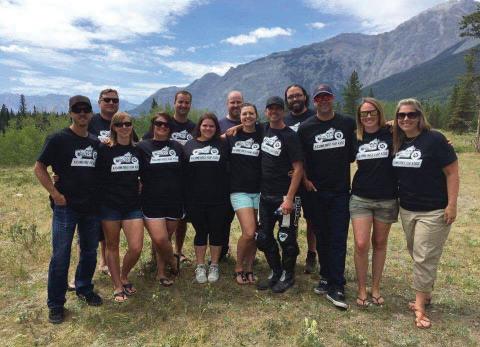
GIVING OURSELVES
I decided to travel to Guatemala to see how the soup mix from the campaign was incorporated into school meals. It was cool to be on both ends—helping raise the money to ship the soup mix and seeing kids enjoy it. The mothers who volunteer to cook had massive vats cooking over open fires and it smelled great. The women love being involved in feeding the children in their community. When the school kids came with their bowls, as a mom, I was wondering “Are they gonna like this or are they gonna be like, ‘No! I’m not eating this!’?”. But they were excited—you could tell it was a satisfying meal for them.
As donors, we’ve seen the numbers and we know FH’s work is making a difference in the battle against malnutrition. On my trip, I got to witness FH’s involvement in the entire community, not only in the soup distribution; I got to see the real impact they’re making. For our family, FH is the perfect place to give. We don’t have to wonder about where the money is going—
we’ve seen that it’s going where it needs to and it’s working! As I visited Guatemala, I prayed for God to show me my

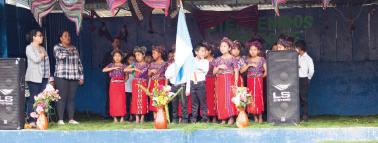
role. I (Kyla) felt confused—if I wasn’t going to work with my hands, what was I going to do? I was surprised by the power of simply being present. Of showing the families we cared enough to meet them and see how impressive they really are. In this instance, God was asking me to give my time, attention, my presence.
I did have the privilege to offer a bit of practical support to one mom we met. Her youngest was having health concerns that sounded like colic—lots of crying and irritability. I really wanted to see the baby; in my experience as a pediatric nurse if I can see the baby then I’ll have a good idea of what’s going on. Overall, he was a healthy, well-fed infant. I prayed the whole time, “God help me to find something if there’s
“On my trip, I got to witness FH’s involvement in the entire community, not only in the soup distribution; I got to see the real impact they’re making.”
— Kyla Meston
22 ISSUE 27
Creative fundraising—like riding motorcycles for Kilometres for Kids!—is a great way to build community. Aaron and Kyla (centre) celebrate with their community group and event committee at the ride’s final stop outside Canmore, AB.
a problem”. But what I felt like telling the mom were some basic things about reflux and abdominal discomfort, and some feeding and sleeping techniques. These might sound simple, but if you’ve had babies who are easygoing and all of a sudden you have a child who cries all the time and you feel like he’s suffering—I’ve experienced that as a mom and it really weighs heavily on your heart. With the interpreter I was able to do some teaching and then encourage the mom that she was doing a good job. Of course she should take the baby to a doctor if she was concerned, but she should also feel con fident trusting her instincts and her ability as a mother. Then I prayed for her and the baby.
And that was most of the trip—being supportive and af firming, focusing on being present and listening. The people were so proud of what they’ve accomplished, and rightly so. And they were proud that Canadians like us would come just to see what they’ve done and support them in prayer.
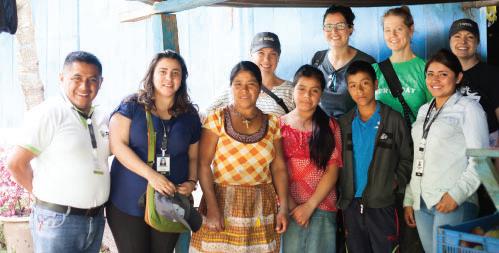
GIVING HUMBLY

In our personal experience, prayer is the most important gift a person can give. Beyond finances, prayer is ultimately the thing that’s going to change lives. And, boy, do the people in Guatemala get that! Everywhere we went they wanted to pray for us! When we prayed together, instead of encountering the poverty and pain we expected, we encountered joy and fullness and fulfillment through our fellowship. We realized that, although material poverty exists, we’re not just the “haves” in Canada and the “have nots” in Guatemala. We’re brothers and sisters in Christ, all being reconciled, all being redeemed. It was so beautiful to have a community of people we thought we were taking care of turn around and care for us.
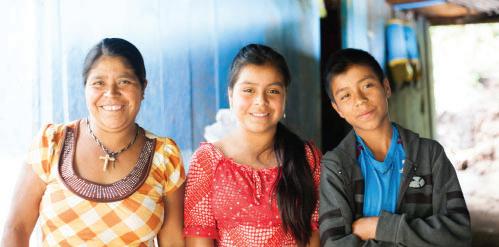
GIVING COURAGEOUSLY!
We want to encourage other Canadians to consider making generosity a central practice in your families, whether you can give a little or a lot, whether you can give money or something else. Give generously either way because God is going to bless it. There are opportunities everywhere to give our time, our efforts, our passion to educate others on important issues, or even simply our presence. We’re con fident if we all keep asking “How can I help? What can I do?” God will show up.
Many Canadians are not aware of the many benefits, choices, and potential tax implications to estate planning. But you’ll want to get it right.

Because of a special partnership between FH and Advisors with Purpose, you can access their expert services. They can help you—no matter what stage of life—to think through your personalized plan that will ensure your will reflects who and what matters most to you.
TO GET STARTED
Call 1.866.336.3315 or E-mail plan@advisorswithpurpose.ca
For more information about Leaving a Legacy with FH, or to start with a simple survey to see if Estate Planning is for you, visit fhcanada.org/Legacy.
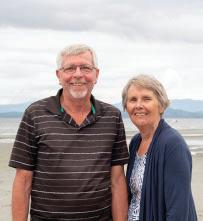
All
to
There is no
and no
personal information or plan will
be shared
meetings are held by phone so the Advisors can meet with people across Canada. It is absolutely free
you.
obligation,
one will try to sell you anything. Your
never
with anyone.
“My wife and I invest here because this work empowers communities and brings hope. We want this important work to continue.”
— Ben Hoogendoorn (Abbotsford, BC)
Kyla solidified a powerful bond with local mothers and their families, recognizing a global family.



1-31741 Peardonville Road, Abbotsford, BC V2T 1L2 1.80v0.667.0605 info@fhcanada.org fhcanada.org Tune in to conversations with Canadian poverty experts that help you identify root causes and create lasting solutions for a poverty-free world—at home and around the world. POWERED BY WAYS TO LISTEN FHCANADA.ORG/PODCAST NEW EPISODES EVERY OTHER WEEK










 Because of Muslima’s intervention, this mother stopped the marriage of her underage daughter.
Because of Muslima’s intervention, this mother stopped the marriage of her underage daughter.









 Bukiende, Uganda
Bukiende, Uganda



































 Eryn as a young child sitting in her father’s project garden managed by a group of local women.
Eryn as a young child sitting in her father’s project garden managed by a group of local women.









 Sneha ReddyNaxma Akhtar
Sneha ReddyNaxma Akhtar









 /Written by Colton Martin
/Written by Colton Martin

 School Supplies from the Gift Guide help creative kids like Phither thrive at school.
School Supplies from the Gift Guide help creative kids like Phither thrive at school.




 Eryn sitting in her father’s project garden managed by a group of local women.
With a dairy cow, a farmer can increase his family’s nutrition and income.
Eryn sitting in her father’s project garden managed by a group of local women.
With a dairy cow, a farmer can increase his family’s nutrition and income.



 Written by Aaron and Kyla Mestons
Interview by Carissa Youssef Adapted by Eryn Austin-Bergen
Written by Aaron and Kyla Mestons
Interview by Carissa Youssef Adapted by Eryn Austin-Bergen











